




Say hello to smoother communication
At BT, we believe that everyone deserves to communicate. Many of our customers rely on their landlines to connect with loved ones and complete important everyday tasks. However, when problems arise, not all methods of communication may be easily accessible to all, leading to frustration and unneeded stress. This
is why at BT we focus on personalised one-to-one service. Viewing accessibility as a fluid, ongoing process is not just a facet of our business, it is our business, from the ground up. With our “Here For You” campaign we’re putting technology and compassion hand in hand to foster a more supportive environment for those with hearing loss, communication needs, different financial circumstances and more.


We’re constantly trying to revolutionise our approach to inclusivity, from adaptive devices and teaching new digital skills to helping you get the best value for your budget. We want you to get the best out of your services with us, so knowing about your circumstances helps us work with and for you. Here’s just a few examples of what you can expect from us:

12,000 staff trained in empathy, compassion, and access needs ready to help you both in store and online
Financial support such as BT Home Essentials for lowcost broadband and phone plans
Personalised suggestions for new technology, products, and services to help you with everyday communication
At BT, we believe that everyone deserves to be heard, understood, and valued. We want to empower everyone to lead independent, fulfilling lives. Let us know if you have any additional needs that we should be aware of so we can provide you with the support you need. We can help you with communication needs and support you with account management if you experience a significant life event, such as losing a loved one, or living with an illness. Share your circumstances via your online MyBT account or let one of our service agents know the next time you call us. You can also visit the Here For You website to find out more information on what we can do for you, one connection at a time.
At BT, we believe that everyone deserves to communicate. Many of our customers rely on their landlines to connect with loved ones and complete important everyday tasks.
Relay UK, a unique app that allows those who are deaf, hard-of-hearing and speech-impaired to relay information on phone calls using the national relay service, as well as send free SMS texts to connect with emergency services if needed
Support with digital skills in partnership with AbilityNet, so everyone can get to grips with the increasingly important online world
A British Sign Language (BSL) video calling service with fully registered BSL interpreters that have at least five years of community interpreting experience
For more information, visit bt.com/help/ here-for-you/


Winter 2024/25
08 Newsbeat
In each issue we tell you all about upcoming disability media releases
11 Term Explainer
What is ‘Ableism’? DRM investigates the term
EMPLOYMENT AND EDUCATION
14 “Disability isn’t a dirty word!” An Interview With Actress Ruth Madeley
Ruth Madeley tells us about the importance of telling disabled stories on screen
24 How To Be An AntiAbleist With Tiffany Yu
Tiffany Yu tells us all about her new book
INDEPENDENT LIVING
27 Book Review: How To Be You
Isobel Ponsford reviews How To Be You by Ellie Middleton

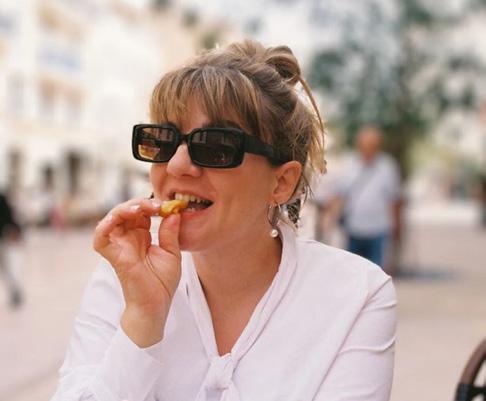
30 Chronic Illness at Christmas: A How-To Guide
Our editor weighs in with her chronic illness tips for Christmas
33 The Change-Makers 2024 List
2024 was a big year for disability - here are the people to recognize
36 A Problem Shared Is A Problem Soon Eradicated
Having stepped down as a CEO, Dr Raju reflects on what he has learned
38 How To Be You: An Interview With Content Creator Ellie Middleton
Ellie Middleton speaks to DRM about her new book, How To Be You
41 Resources: How To Have An Accessible Christmas
Worried about the ‘big day’? DRM has some resources to share


42 The Accessible Christmas Gift Guide
Everything to buy as a gift this holiday season
TRAVEL & LEISURE
44 A City Of A Million Lights
Our editor writes of her love for New York City - even at Christmas time
46 Review: The Pan Pacific Hotel, London
A look at the new accessibility features at the Pan Pacific hotel

Carole

58 Why Do Medical Aids Have To Be Tabuu?
One
owner
& DRINK
68 How To Make Beef Koftas, Jewelled Rice & Mint Yogurt Dip Mr Cookfulness (Ian Taverner) provides DRM with a colourful recipe for Christmas
Executive Editor: Lee Gatland
Art Director: Richard Hejsak
Managing Editor: Lydia Wilkins lydia@sevenstarmedia.co.uk
Sales Team: 01959 543 650 sales@sevenstarmedia.co.uk
Published by SEVEN STAR MEDIA LTD
184 Main Road, Biggin Hill, Westerham, Kent Tel: 01959 543659 disabilityreviewmagazine.co.uk

Disclaimer: Disability Review Magazine (DRM) is published three times per annum by Seven Star Media Ltd. No part of DRM may be reproduced, stored in a retrieval system or transmitted to any form without permission. Views expressed in the magazine are not necessarily those of Seven Star Media Ltd, and are included to provide advice only. No content is a substitute for professional medical advice. During printing, images may be subject to a 15% variation. © Copyright of content belongs to individual contributors with the magazine copyright belonging to Seven Star Media. All rights reserved. Please either keep this magazine for future reference, pass it on for somebody else to read, or recycle it.

Just like that, another year is almost over and completed.
It feels odd to be writing these words; at the start of this year, I felt, well, lost. Unsure of where to go next, what I wanted to do in life - it was a wonderful challenge to be offered an editorial position, with a remit to ‘better up’ disability representation. Wouldn’t it be boring if we were all the same?
Which brings me to the theme of this issue. Traditional media uses a medical model of disability, while running tired stories of the tragedy and the triumph stereotypes - isn’t it brilliant that this person, deemed pitiful for having a disability, is having to raise money for their treatment? (Maybe we should be asking why that is, for a start.) Yet disability is a far greater, multifaceted, nuanced human experience. We should be celebrating that.
As a child I would have loved to have seen people like me reflected on screen or in the books I read. As an old school Whovian, I was beyond excited when I met Ruth Madeley; we worked together for London Fashion Week last year. She was the nicest soul, and we gossiped like teenagers over chicken salad. The introduction - something humble, eloquent - cast a spell, almost: “Hi I’m Ruth, it’s nice to meet you.” She was a storm as part of the show, to close the catwalk - the
punk-couldn’t-care-owning-it attitude was joyous to watch; my soul sang that day. I wish I could tell my teenage self about this; she’d have loved such a story.
Earlier this year, thanks to access being blocked to a building, I’d been upset. It’s not the first time - but it’s unusual to make me cry when this happened. A friend WhatsApped me to say she was coming to collect me - and “Ruth wants to say hello.” (Lydia’s brain, now on haywire mode, completely blank: WHO is Ruth? Do I know a Ruth?) My very own fairy godmother picked me up, sat me down with an ice-cold lemonade, and we promptly put the world to rights on the topic of accessibility. And I left that meeting with the biggest smile on my face possible.
Disability is not something to be ashamed of; it is something colourful, textured, beautiful, human. It’s time to see that - instead of living in a world still based on conformity. I think often of Then Barbara Met Alan - and one of the monologue speeches noting how disabled individuals came together and “fought for rights”, in defiance of pity, tragedy. That is a calling to every single one of us.
Disability is not something to be ashamed of; it is something colourful, textured, beautiful, human.
This is why this issue has the theme of celebration. It’s the run-up to Christmas 2024, and we should permit ourselves that, such as for International Day for Persons With Disabilities. In this issue, you’ll find the usual features, along with interviews, new business releases, and so much more.
Happy Christmas, and see you next year,
x

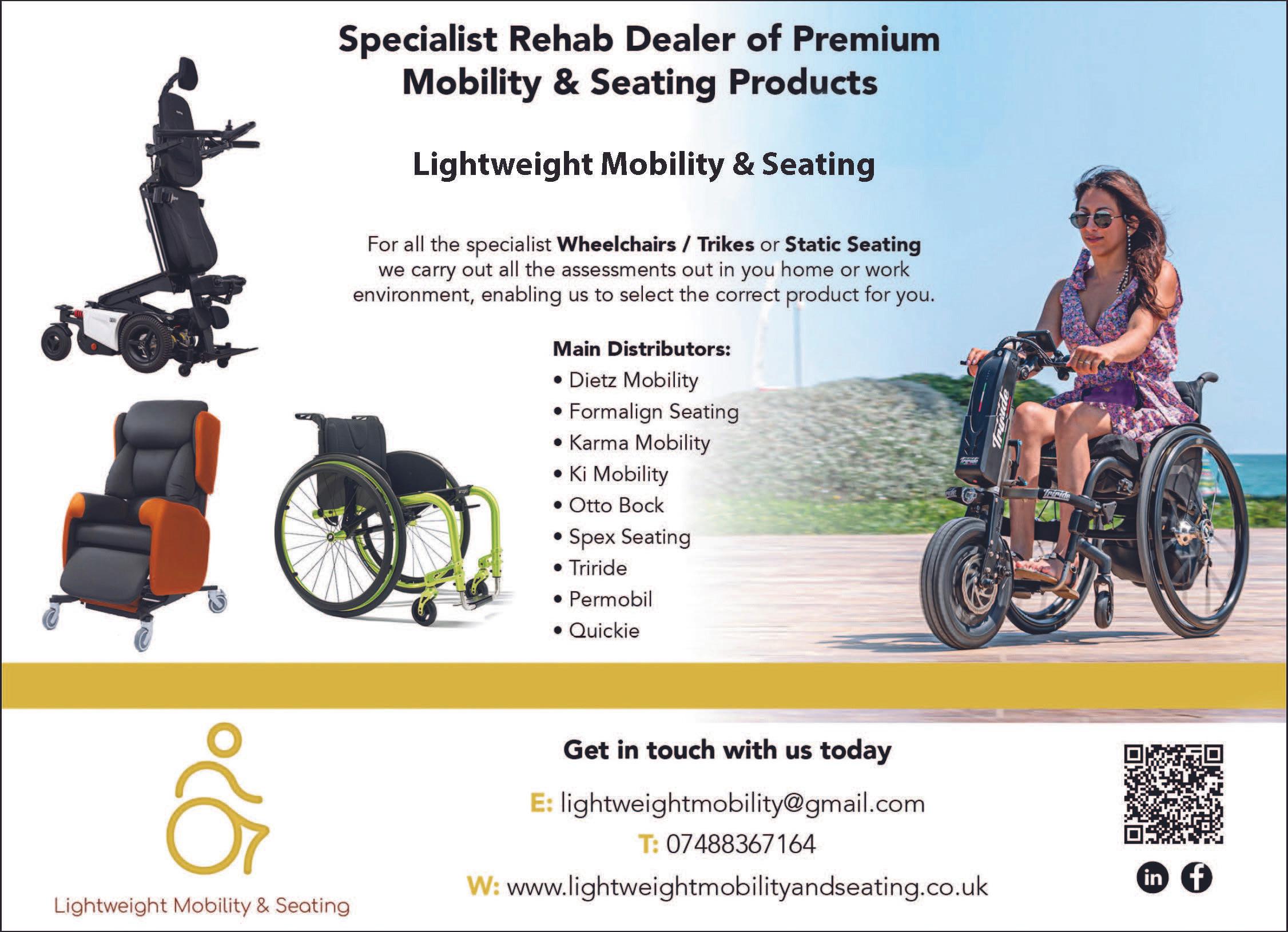
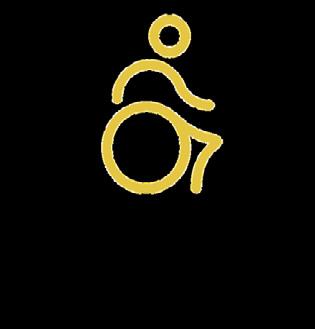
In each issue, we will bring you the latest releases in the disability space - such as new mobility aides, what’s on TV, new books that are just about to be released, and so much more.







Lauded and applauded for its incidental portrayal of disability in all of its humanity, We Might Regret This is a hysterically funny drama about what happens in the world of caregiving and how boundaries become trampled pretty quickly — along with the understanding of disability as a whole. Catch it now on iPlayer.

In our next issue, our editor will be looking at how to start out as a freelance writer when you’re disabled; a ‘101’ guide will be in this very magazine. Right now, she would recommend In Writing by Hattie Crisell, which is a brilliant guide about the art of writing.

A Christmas Carol(ish) is currently on at Soho Place and is suitable for children over the age of ten. Until December 31st, there are performances that are audio described, along with live subtitles - as well as using BSL. To find out more, please visit: sohoplace.org/shows/achristmas-carol-ish
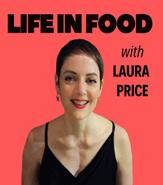
While technically not an event, it’s still worth mentioning; by the time you read this issue, London’s Christmas lights will have returned. For an activity that is accessible with flat roads, we recommend going to look around Oxford Street and other roads.

Life In Food With Laura Price is back for a third season! This time, she is interviewing chefs about their relationship to food - such as when it comes to the topic of Neurodiversity, say. Hosted with Price’s trademark empathy as a questioner, this is a fabulous foodie podcast, now available everywhere.
The Migraine Trust has recently won applause for a series of adverts it has placed seemingly across the UK, to bust the myth that migraines are ‘just a headache’. They are a debilitating, disabling condition - and support is often lacking at best. More needs to be done to support patients.
Since our last issue landed, Purpl Discounts has launched; once you have signed up online - which takes five minutes - you are given access to a range of discounts from mainstream retailers. To find out more, please visit purpldiscounts.com.

The Imperial War Museum is currently hosting War & The Mind, an exhibition that looks at the impact of war and mental health. Mental health & disability are rarely talked about with nuance - and this is the place to start if you would like to know more about PTSD & stigma.


Do you need to have access to water or another drink at any given moment?
Tabuu has recently released a range of water bottles designed to be accessible to disabled individuals; there is also a secret compartment at the bottom, which is ideal for medication storage. Buy online at wearetabuu.com
Hot on the heels of their stateside launches earlier this year, AccessAblethe UK’s largest provider of accessibility information in the disability space - has recently partnered with London, Gatwick to launch a new detailed access guide. Travel should be more streamlined with accessibility information freely available online via Accessable.co.uk
The Wheelchair Alliance, an organisation which represents the voices of wheelchair users, has published a report calling for a ‘more integrated approach’ and ‘greater prioritisation of wheelchair services in the NHS’.
The report, Wheelchair Provision: How to Drive Effective Change, was launched at the House of Lords on Thursday 14th November and completes a trilogy of reports, which were funded by the Motability Foundation
The first report - An Economic Assessment of Wheelchair Provision in England (2022) – highlighted issues that wheelchair users were experiencing with the provision of wheelchairs. The second report - The Value of a Wheelchair (2023) – looked at the false economy of providing wheelchairs that are not fit for purpose and the impact on individuals and the state.
The third and final report, which was produced by independent research companies Frontier Economics and Revealing Reality, outlines three recommendations that could greatly improve wheelchair provision and go some way to tackling the postcode lottery, long waiting times, issues in the supply chain and ensuring that the voices of wheelchair users are heard.
The recommendations include:
1 Creation of an NHSE senior responsible officer and dedicated wheelchair service commissioners: There should be a senior responsible officer within NHS England (NHSE) and dedicated wheelchair service commissioners within Integrated Care Boards (ICBs) to oversee wheelchair services in England. NHSE should require each ICB to have a dedicated wheelchair
service commissioner with the appropriate skills to monitor contracts and design appropriately funded services for their local population.
That NHSE addresses the regional and local variation in service quality by defining a national
Wheelchair provision needs to be improved and made a priority by the government and NHS.
eligibility criterion and hold each ICB dedicated wheelchair commissioner to account for the governance and quality of the service they provide.
The Department of Health and Social Care take a more active role in ensuring the quality and efficiency of wheelchair services through better procurement and supply chain management.
Nick Goldup, chief operating officer and chair at Wheelchair Alliance, said: “Wheelchair provision needs to be improved and made a priority by the government and NHS.
“Much of the data currently available for wheelchair services is estimated, out of date and not comparable to form a local and national picture. We need a central, accountable body to ensure consistency, no matter the postcode.
“It is a basic human right that everyone who needs a wheelchair should get the right chair at the right time. By putting these recommendations in place, we can drive effective change together.”

To find out more about the Wheelchair Alliance, visit wheelchair-alliance.co.uk






The War Between The Land & The Sea is the title of an upcoming Doctor Who spin-off from the BBC; in this issue, we spoke to actress Ruth Madeley, who plays a central character in the new series. The broadcast date for 2025 has yet to be confirmed.

Hester Grainger is one half of the Neurodiversity consultancy firm Perfectly Autistic; earlier this year she went viral, owing to a candid interview about a later-in-life diagnosis of ADHD. She will be going on tour next year with ADHD Unmasked; flick to our Christmas gift guide to find out more!

By the time you read our next issue, Disability Review Magazine will be launching our brand new podcast; the release was delayed due to healthrelated issues in-house. Hosting conversations on disability, we will be interviewing a range of disabled people.
Ramping Up Rights: An Unfinished History Of British Disability Activism is a nonfiction book by journalist and author Rachel Charlton Dailey. Due out in July next year, this landmark book is not to be missed.

Following on from the successful launch of a reverse jobs fair to assist disabled individuals into work, SIC, a social enterprise based in Coventry, is set to expand the event with future initiatives to take place in 2025. Visit Sicofficial. co.uk

The 4th of January is World Braille Day, which should be noted on all calendars everywhere. There is not enough effort to make, say, the internet accessible, along with basic every day items such as packaging on innocuous household objects. A chance for us all to reflect.
Two days, seminars, demonstrations, talks, mobility equipment to buy, and more. What’s not to love? Naidex, the UK’s biggest annual disability conference, will be returning next year for 19th - 20th March at Birmingham’s NEC. Tickets are free; this event is not to be missed.
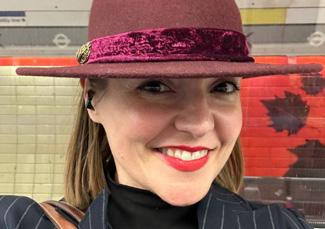
Victoria Jenkins, the founder of Unhidden, is a recognisable name in the world of adaptive fashion; she has hosted several fashion shows that involve disabled models throughout. She is currently working on designing an adaptive fashion range for Primark, likely due out within the next year.


Following on from her debut book, Dr Frances Ryan will be releasing Who Wants Normal? next year. A look at disability and womanhood, the book dissects a range of issues and also interviews a multitude of notable individuals.
While this issue of Disability Review Magazine is themed around celebration, we need to look at ‘ableism’. In each issue we deconstruct a concept or new phrase, to open up the conversation around disability.
When it comes to any kind of definition, we typically usually turn to Google for some kind of explanation - or at least a dictionary. According to Google, ableism is in part defined as a form of discrimination and social prejudice against disabled individuals, based on the idea that a ‘typical’ ability is superior. In essence, this is to create a hierarchy based on ability.
In the UK we have the Equality Act; this vital piece of legislation defines what a disability is in law, as well as how - if you meet this definition - you also have the right to request reasonable adjustments. This is a piece of legislation that codifies the right to be free of discrimination if you possess a protected characteristicwhich is what disability counts as. Ableism is something we need to be on the lookout for - as it is not just the result of discrimination at an institutional level. But more on that in a second.
Ableism, when it manifests, has a multifaceted appearance. It is not just a concept that we talk about at an institutional level, such as if there is a ‘failure’ to provide a ramp or assistance on to a train yet again. Ableism can look more benign, as it can crop up in commentary known as microaggressions. Ever had a boss who has insisted on talking about the one time he was nice to a disabled person - just because you are present? Ever not been invited to a party on the assumption you would not be able to get in? Or what about being relocated to the back of an empty restaurant to eat, just because the proprietor does not want any possible patron to be ‘put off’ by your mobility aid? These are all examples of ableism - even when said with ‘the best of intentions’. The passive-aggressive insistence on taking away someone’s agency, or commenting ‘have you tried..?’ is all covered under this definition.

As a side note, the way we talk about, write about, and present disability is key to combatting ableism. Disability is multifaceted, far outside the universal symbol of a wheelchair user. Generally, ‘disabled person’ is preferred in the UK. ‘With’ a disability is to suggest an unwanted extra. The same goes for other uses of language - slurs that are reductive are not okay to use.
Ask a disabled person what ableism can feel like, and they will all have a different story - because this encompasses a range of acts, including hate crimes and more institutional forms of discrimination. But it leaves us feeling afraid, not trusting, and alone.



Exclusive to Rompa®, Snoezelen® rooms are the original sensory room. Rompa® offer a wide range of customisable products to choose when designing your room.

Rompa® is a proud British manufacturer based in Chesterfield, Derbyshire. Our skilled team design, create and assemble a wide range of Snoezelen® products in-house.
Rompa® provides a free 3D design of your Snoezelen® sensory room upon request. Our team will create a customised design to fit your needs and budget.
For over 35 years, Rompa® has improved lives globally and built a trusted brand. As market leaders, Rompa® offers extensive experience and knowledge.





“
The entire design process was made easy due to the knowledge and expertise of the Rompa® team; they provided sound advice and suggestions for the room’s equipment and understood the needs of the users with Autism Spectrum Disorder.
The finished room was installed to a high quality and even the training and hand over was of high quality, an all-round quality end to end process.
Project Co-ordinator Harding Stone Academy









“Disability isn’t a dirty word.”
Known for landmark roles in Then Barbara Met Alan, Years & Years, and last year’s Doctor Who specials, actress Ruth Madeley talked to Disability Review Magazine about the need for disabled stories on screen.
The blonde hair, the hooped earrings, a complimenting ‘coffee break’ tee - a smile booms down the Zoom link. She’s back from a honeymoon and ready to get to work, is Ruth Madeley. She jokes she feels as if she’s forgotten how to do her job, having spent time off workand is reassuring at the slightly panicked look on my face: “It’s just gone, but it will come back. It will come back.”
Between, that’s what its name is. So, yes, you could ask [me about filming that]. And thank God I’m able to say because I get so nervous that I’m gonna say something I shouldn’t!
I have not given away any spoilers, so there you go.
Thank God.
Filming for the next Doctor Who spin-off is long underway, and is still going ahead at the time of going to press. The BBC, known for its protective notoriety around leaks on the show, means Madeley remains tight-lipped for now: “So we were filming the Doctor Who spin-off, called The War Between Land and Sea. Well, The War
But it’s out there.” She smiles a sigh of relief: “I have not given away any spoilers, so there you go. Thank God.” Asking for a spoiler, as any self-proclaimed Whovian would do, is met with a firm “No.”
But it’s nice to have a long job, she reflects, making for a longer duration on set with “fantastic people.” Her candour is striking; Disability Review Magazine will be printed in December, I tell her - but she’ll still be filming. She jokes how she may look like “live roadkill” by the end of filming - and to “be prepared!” That’s the headline quote I joke; Madeley responds in kind, laughing: “That’s it. That’s the headline!”

I am an incurable optimist, and I will always look at where we’ve come from and how far we’ve come and what’s been achieved.
Last December saw David Tennant and Catherine Tate reprising their respective roles from almost two decades ago, in a spin-off series of ‘specials’ on the show. In the last episode, a regeneration scene gives way to Ncuti Gatwa becoming the next Doctor, as well as a wheelchair accessible TARDIS. (The change had been sparked by a letter from a young fan to the show’s current front-runner, Russel T Davies.) Madeley was also shown as an ambulatory wheelchair user on screen, a stylish, brainy scientist with rockets attached to her wheelchair in case of alien invasion. With disability representation on screen at an alltime low, the episodes she appeared in were arguably a landmark - and we parlay into a deep dive concerning on-screen representation.
“So, I think, like, there’s so much more conversation now around disability, both on and off screen. And I think we have - look at where we were pre-pandemic, and I think, oh, we’ve come quite a way. And then certain things will happen.
“But in the industry, I can definitely say representation has definitely, definitely improved, and I will stand by that. And, look, I always say this, Lydia. I am an incurable optimist, and I will always look at where we’ve come from and how far we’ve come, and what’s been achieved.”
She offers something of a call to arms when it comes to the disability rights movement: “But I’ll never accept that it’s done because it is far from done. We’re not finished. We’re nowhere near finished. And that’s why that’s one of the beautiful things about my job, and one of the great things I love about my job. One of the most exhausting things about my job, actually, but, I am very… if I can change even half a percent, I will take that as a good day.”
Access coordinators on sets have changed so much, she says, while also sighting the work of Jack Thorne as a landmark change in the production space. Thorne has produced a range of notable disability-specific media projects in recent years.
She continues: “Because sometimes
when you’re on set and you have an access question, you have to do so much work before you even get to the job that you’re being paid to do because you have to make sure this is set up and that’s set up, and it’s even more intense if you’re filming away from home and you’re staying away from your house.”
“So to have access coordinators on set and have them be responsible for all of that, you just have one person you can go to who you know will take care of it, and that takes away so much stress…” It’s a massive change, for the better, she says - but adds: “And, but, yeah, still a long way to go.”
When it comes to the need for accessibility, what is the one thing she wishes non-disabled people knew and why? There’s a glint in her eye as she processes what I’m asking: “This could be an essay question!” She smiles. “One of the things that I wish non-disabled people knew was that accessibility, is it only helps everyone. Not everyone can use stairs. Everyone can use a ramp. And I always think the chance of you making it through your life, being non-disabled when you… when you die, is very, very slim. So I can guarantee whatever

Credit: Instagram@ruthmadeley


One of the things that I wish non-disabled people knew was that accessibility, is it only helps everyone.
accessibility is put in place is only beneficial to you to other people as well.” Further explaining, she adds: “It’s not, it’s not something special. It’s not, you know, air quotes, it’s not ‘special’. It’s not niche. It will benefit everyone, everyone.
“And then I think the other thing I would like to say is that, I wish non-disabled people knew that when disabled people have [access] needs, like a wheelchair or [needing to use] mobility equipment, we’re not just given those things.” In our last issue, we interviewed the founder of the Rights On Flights campaign, an individual who wants to guarantee redress such as if a mobility aid is broken in transit on an aircraft, along with other access needs to become a standard ‘given’.
Yet, wheelchairs are not just a ‘given’ from the health service; wait lists are long, and money is oftentimes crowdfunded to afford basic aides.
Madeley illustrates the blasé attitude to mobility aides: “They’re just like, can’t you just get a new one? Like, if - if your wheelchair is damaged on a flight, oh, well, well, can’t you just use this one, this random heap that we found in the back?”’ It’s also not just out and about, or in the
workplace - access in personal spaces is not a ‘given’.
“When me and my Hubs, when we were doing work in the house, it’s like - we had to decide whether we wanted, what was [a] priority, an accessible bathroom or an accessible kitchen? Because we couldn’t afford to do both at the same time - and it’s things like that. I think people just think that access requirements are just given, and mobility equipment is just there for free, and there’s no waiting list, and it’s all good.”
“And, that’s just not the case. So I think that is a big [thing] that I’d like to put in skywriting everywhere. It’s not free. It’s not free, and it’s not as easy as people think to get a hold of.”


We bond over a paraphrase of a Dolly Parton quote which seems an appropriate response - that it takes a lot of money and time to make disability look ‘easy’. (She once reportedly said it took a lot of money to look ‘this cheap’.) Madeley: “I absolutely love that quote. I mean, Dolly’s a legend.” She muses more - noting that trolls online no longer bother her. Then, a revelation that’s kind of amusing in a not amusing way: “One of the worst things anyone has ever, ever, ever said about me online is that my wheelchair was ‘basic’.”


“I was like, excuse me?” (The person in question had been seemingly upset her wheelchair had not been equipped with the fictional rockets and launchpad used on the Doctor Who specials.) An online troll can “say anything, but don’t come after my wheelchair. I was like, excuse me? Excuse me? A basic wheelchair. What would they expect it to be like? A full up pimped, bougie [chair]?” It serves as her own reminder that mobility aides are little if at all understood. But “All hail” the logic of Dolly Parton’s reported philosophical quote, she wraps up, laughing at the absurdity.
November is/was (depending on when you, dear reader, are reading this) Spina Bifida Awareness Month.
Is she okay to talk about her diagnosis?
“Sure. Not at all. Thank you for asking. That’s another thing I wish non-disabled people knew. We always say, is this okay if I ask this?” She laments the standard questioning - the invasive what’s wrong with you, or what happened to you?
“Thank you so much for asking about my diagnosis. So I was born with Spina Bifida. So for people who don’t know, Spina Bifida means split spine. So you’re born with a hole in your spine and all of the nerves that [are] in your spinal cord - some of them grow on the outside, so they get damaged. So, some people have a hole. Some people have a lump.” At eighteen months old, Madeley was also diagnosed with Scoliosis - a curvature of the spine that had resulted from her diagnosis of Spina Bifida. Matter of fact, she states: “So, yeah, I’ve
been disabled all my life. I’m an ambulatory wheelchair user, so that means I can walk as well. Not very far, but I walk around my house, and I have a stair lift and things like that, but I am able to stand and take some steps as well.”
She is at pains to emphasize the reality of lived experience - in that there’s seemingly an expectation to perpetually remain sad about being disabled. “It’s never made me sad. And I think that, some things have been heightened when you’re growing up, like body confidence issues. I was always very aware that my body wasn’t the same as everyone else around me, because I went to mainstream school, and I was pretty much the only, I was the only person in my primary school and then I was the only person in my year at secondary school that was disabled. So I always grew up knowing that I was different, but that difference has never made me sad.”
“If anything, it’s made me a bit more of a nightmare to deal with because I’m just so unbelievably stubborn! So, so unbelievably stubborn and incredibly determined. I think a lot of that has come from my family. I grew up with [a] mum and dad, [a] sister who’s 3 years older than me. She’s non-disabled, and me having a disability didn’t really stop us from doing anything.”
She continues: “We just found a different way to do things. So, I can’t think of one thing that I wanted to do as a child, or in my life, really, that I haven’t been able to do. Maybe walk in high heels, but now I see the pain that that causes a lot of women. I’m like, no!”
It’s not free, and it’s not as easy as people think to get a hold of.


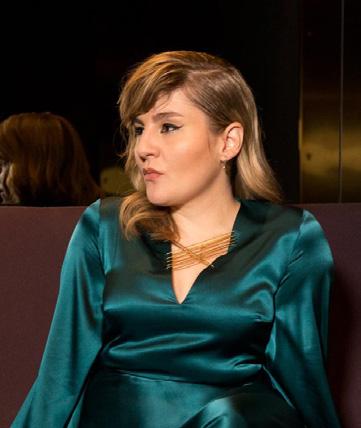
So I always grew up knowing that I was different, but that difference has never made me sad.
Madeley notes how she feels a sense of responsibility, now, such as to “perhaps a young 12-year-old Ruth”, watching the world go by through her TV screen. To be able to show up for a younger self, to know that you are being seen is something of a driving force. But how does she reconcile that with the potential for being pigeonholed? She agrees that “it’s a really hard thing” to grapple with - but views herself as becoming “more vocal” about the need for nuance. Just because someone has not disclosed a disability does not mean to be non-disabled as a default, such as when it comes to ‘first disabled person to..’ type awards, she notes. To be a disability educator is not a default; the expectation is invasive. And to not fall into such a trap is something Madeley had learned over time, in choosing her moments. “There’s some days when I’m happy to - [this is a] word I hate, educate -
and help people, you know, make things better. Then I have days when I’m like it’s not my job to educate you. There are plenty of disability consultants out there. If you care enough, pay someone to teach you. I’m not a teacher.”
But: “I’ve kind of learned that I don’t have to be [a] teacher all the time, and it’s fine. And as well, this is why we’re doing interviews. Like, this is so great because I’m like, everyone knows my opinion on it!”
And therein is why any disabled representation on screen is important. “See, people think disability is one thing, which is why having more disabled stories on screen is so important - because my experience as a person who was born disabled, who is an ambulatory disability user, is incredibly different from somebody who’s autistic, who’s deaf, who was paralysed in an accident, who’s blind. There’s so many different experiences of being disabled that, it’s just, it’s
Nobody is you, and that’s, that’s a good thing. That, that’s a really good thing.

utter madness to think that one thing covers everything.”
What would she say to 12-yearold Ruth, from where she’s sat today, at the peak of her creative powers? Momentarily flustered, Ruth Madeley pauses to think. “Nobody is you, and that’s, that’s a good thing. That, that’s a really good thing. And you don’t have to be perfect for everything else to make up for the fact that you have a disability.”

“I’m not, I’ve always been like, I want to be the best at everything, and shock horror, I’m not! So that’s fine. I have, I want [her] to just, to stop being bloody hard on yourself. Stop being so bloody hard on yourself and, and trust the skills that you have and what you’ve been given, because that’s what’s ultimately gonna pay your mortgage!”
At the moment, she’s writing across a range of screen projects, alongside filming. She smiles to herself: “So that’s where I am at the minute, writing, filming, and, at the end of the year, I’m gonna see out 2024, probably in my pyjamas somewhere.”
The War Between the Land and the Sea will be broadcast on BBC 1 and Disney + in 2025.
“The Senses Project has helped me so much in so many different ways, they’ve given me the confidence. Before them I couldn’t go out.”




Our programme offers a tailored mentoring style of support. We aim to nurture every young neurodiverse adult we mentor, to understand themselves, to feel confident, and have the determination to pursue their aspirations.
Our programme offers a tailored mentoring style of support. We aim to nurture every young neurodiverse adult we mentor, to understand themselves, to feel confident, and have the determination to pursue their aspirations.
Our model uses a sensory trauma approach, incorporating the PACE Model, Restorative Justice, Life Story Work, and Sensory Processing Strategies. The approach we often use can be seen as unorthodox and unique, from the typical support options available, and it needs to be.
Our model uses a sensory trauma approach, incorporating the PACE Model, Restorative Justice, Life Story Work, and Sensory Processing Strategies. The approach we often use can be seen as unorthodox and unique, from the typical support options available, and it needs to be.
Our approach to create affirmation is key to how our clients grow as people, and for many, really begin living their lives.
Our approach to create affirmation is key to how our clients grow as people, and for many, really begin living their lives.
Imagine exploring into your own experiences and practices, inspiring you to delve deeper into a topic.
Imagine exploring into your own experiences and practices, inspiring you to delve deeper into a topic.
By welcoming professionals and parents into a nurturing environment, where they can share and learn from each other, we create opportunities to improve and achieve together. Whether you join us for half a day or immerse yourself in a 7-hour day, our workshops will be tailored to you. By sharing our knowledge, experience, and unique strategies, we encourage you to expand your toolkit, leaving with a newfound confident you!
By welcoming professionals and parents into a nurturing environment, where they can share and learn from each other, we create opportunities to improve and achieve together. Whether you join us for half a day or immerse yourself in a 7-hour day, our workshops will be tailored to you. By sharing our knowledge, experience, and unique strategies, we encourage you to expand your toolkit, leaving with a newfound confident you!
01202287855 www.thesensesproject.co.uk
We are hosting a FREE inclusive workshop tailored to the group attending. We will reflect on ‘What you do well’ and explore ‘How you can do better’. During the workshop you’ll be able to learn from personal experience, understand the Affirmation Process, and get an insight into our Independence Model. You can expect:
We are hosting a FREE inclusive workshop tailored to the group attending. We will reflect on ‘What you do well’ and explore ‘How you can do better’. During the workshop you’ll be able to learn from personal experience, understand the Affirmation Process, and get an insight into our Independence Model. You can expect:
| Group Exercises | Team Building | Case Studies | Group Reflection
| Guided Self-Reflection | Inspirational Stories | Creative Strategies
| Group Exercises | Team Building | Case Studies | Group Reflection | Guided Self-Reflection | Inspirational Stories | Creative Strategies
| Monday 20th January 2025
| Monday 20th January 2025
| 09.30 - 16.30
| 09.30 - 16.30
| Discovery Court Business Centre
| Discovery Court Business Centre 551 Wallisdown Road, Poole, BH12 5AG
551 Wallisdown Road, Poole, BH12 5AG
referrals@thesensesproject.co.uk









Owing to a TikTok series that went viral during the early days of the Covid 19 lockdowns, Tiffany Yu has since written a book. Out next year in the UK, The Anti-Ableist Manifesto is a guide to supporting disabled individuals.
QWhat was the impetus behind The AntiAbleist Manifesto, and what can readers expect from it?
AThe impetus for it was starting this series on social media called The Anti-Ableism Series. It’s got 270 parts nowwhich is the short-form video series - and a couple of people had reached out to ask if there was another way that they could engage more deeply with my work. And I think after, part of why The AntiAbleist series has 270 parts and growing is because there’s no one way to be an ally.
I think that for far too long, we have become even more polarised, at least here in the US, probably also in the UK .
So this book kind of takes a format of Me, We, Us - which is kind of known in social impact spaces about how we can create change, to say that no matter where you are on your disability/allyship journey, we can meet you where you are. And, hopefully, if you’re starting with a Me, if you’re starting with a We, hopefully, get all of
us to an Us, so that we can build a more disability-inclusive world together. Interestingly enough, I actually think that the core audience for this is nondisabled people. One of my favourite reviews that has come in was that, it left her [the reader] energised - that building a disabilityinclusive society is possible. So in terms of what readers can expect, I’ve tried to make this as actionable as possible.
One of the lines of my work is this line; starting or ending discrimination starts with self reflection.
So it’s gonna be a combination of self reflection questions because we need to know where our starting points are, action items that you can take. And I literally, I really do believe that no matter where you are on your journey, there is at least one thing that you can take away that you can take action on right away.
(Please
QOne of the things that I really enjoyed about the book is there is a passage where you say about how we need to afford people grace and understanding because we cannot expect everybody to be at their most actualised self, their most anti-ableist self. What is the one thing you would like non-disabled individuals to know about being a disabled human being in the 21st century?
AThat’s a good question. I think, I think it’s that we’re wonderfully human and ordinary.
I went to Georgetown University for undergrad. It’s got a mix of liberal and conservative perspectives in there. I also worked in the corporate world. I worked on Wall Street, you know, which can be more fiscally conservative-leaning. And I got asked, like, how I can exist in all of those spaces? And I think back to my college friends who I’ve known for 18 years, and allyship starts with intimacy. Like, they care about disability because they care about me.
And I think that for far too long, we have become even more polarised, at least here in the US, probably also in the UK, and it makes it easy to ‘other’ people. But when you’ve known someone for literally 20 years, maybe you don’t agree on everything politically, but you care about each other as human beings.
And that’s why, I don’t know, that’s why I feel grateful that, to me, like, disability inclusion is not a partisan issue. What has been so rewarding about this process is how excited people are about this other than me. I grew up feeling extremely isolated in my experience and to have just, like, so many individualsand these are disabled and non-disabled people who are excited about this book out in the world.
For the disability community, it’s more visibility for our community. I think the big takeaway for me [is] that I would like non-disabled readers to learn more about [this] and, and it sounds so seemingly simple, but I just look at my own experience, and it’s like, the more that people got to know me, even though when you meet 1 disabled person, you meet 1 disabled person, but they started to become more interested in wanting to learn about this human experience that they may not have necessarily shared.
And I do love the point that I make in the book around how, like, if we all really prioritise accessibility, when we all become disabled, it won’t be such a terrifying, isolating thing.
And that’s actually something I’ve brought up in my corporate presentations too. I’m like, why like, why are we so uncomfortable talking about disability? And then people will say, oh, we fear that it might become us. And I was like, well, what do you think is underlying the fear? And they said fear that we won’t have access and accommodations. And I’m like, exactly why we should be pushing for it.
QDo you think that the internet can be an asset to activism? I’m asking this in the respect of what’s been happening with the US Congress, particularly with the ‘TikTok ban’.
AI would say yes. I had been doing some advocacy around TikTok. I’ll say, number 1, when traditional media outlets have told us that our stories are not newsworthy enough or they have put us into tragedy or heroic tropes, social media enables us to show up as ourselves, in the soft, tender parts, in the things that have made us hard. But it has been a way that we’ve been able to reclaim our narrative. And I recently got invited to [the] White House creator economy conference, and [then] President Biden spoke and he said, you are the new media. We’re having this confluence of the traditional outlets. Like, I love that there’s this magazine that exists out in the UK.
Q What is the one thing that you practice on a day-by-day basis in the respect of anti-ableism?
AThe first thing that came to mind is rest and harmony. And, I do have a chapter in the book called, to be in community with disabled people.
And I think that I’ve had to learn that this one alone [in that] Tiffany, you as an advocate alone is not gonna dismantle everything that is ableism, the system of oppression.
I think the other thing I have to recognise is that I also know I’m unlearning my own ableist tendencies. And I think that we have a tendency to react viscerally when we’re called ableist or racist or any of the other
things, but our society has upheld all of these systems of oppression that it is going to take some time for us to unlearn all of these.
So, yeah, part of it alongside rest, I also thought of, like, passing the mic, and I feel really grateful to have started this amazing community Diversability.
And then also know knowing that my own sustainability is a part of my advocacy too.
The Anti-Ableist Manifesto will be out in the UK on March 6th 2025.

3 pieces of advice from Tiffany Yu for continuing your own anti-ableist journey:
“I love the question, ‘do you have what you need to fully participate?’
That’s an alternative to asking someone what their access needs are, provides more information than asking what someone’s disability is, which doesn’t provide information.”
“The second thing is another script, which is ‘let me know if you need any support.’ ”
“There’s a quote I came across from this Harvard Business Review article that said, “Using ableist language doesn’t make you a bad person. It makes you a person. But if you have the privilege to try, then why not try?”

By Isobel Ponsford
Ellie Middleton has released her follow-up book to last year’s Unmasked. Titled How To Be You, the new book is out now. But what did the DRM team think about it?
The most interesting thing I learned while reading Ellie Middleton’s new book is how to unmask.
Unmasking is something that most neurodivergent people to some extent struggle with, and Ellie has shared some useful tactics on how to let go of the mask you put on and learn how to be free.
The book is designed to be a practical guide on how to work with your brain, not against it. She shares tips and tactics on how to not to exhaust yourself and so avoid burnout, which is a common issue
for autistic people. The book starts with a deep analysis of the systems of oppression in our Western society and our understanding of how we ‘should’ function, do things, and behave. Middleton helps to educate the reader on issues such as capitalism, the patriarchy, white supremacy, ableism, and colonialism. For the next part of the book, she takes a deep dive into the eight separate topics of Working memory, Self-monitoring, Inhibition/Impulse control, Emotional regulation, Flexibility, Planning and Prioritisation, Task initiation, and Organisation.
Something I personally really liked about the book is that there are blank sections to fill in. This is useful because you are able to not only take in the interesting tips but also come up with your own ideas as well.
If you have read Ellie’s first book and are looking to read this one, I think it’s important to point out the difference between the two. Ellie’s first book was very much a memoir, talking about her life and her experiences; her second book is more of a practical guide with helpful tips. Something I found slightly difficult about this book, compared to her first book, is that each chapter contained a lot of complex information and was very factual, therefore it was a book I could only read in short chunksotherwise it felt a bit overwhelming.
Something I personally really liked about the book is that there are blank sections to fill in.
If you were to ask me if you should read this book, I would say definitely. It is written in a way that will be helpful to so many neurodivergent people out there who are looking for ways to be helped. I would definitely recommend this book.
How To Be You by Ellie Middleton is out now.
Three interesting things I have learned from reading the book:
1
Allowing ourselves to ask for adjustments can make a huge difference.
2 Pathological Demand Avoidance (PDA) means that many neurodivergent people aren’t avoiding demands, they just have a strong need to be autonomous.
3
We should look at how we reframe rejection (to try to see feedback in a different more positive light).
We’re committed to empowering you with accessible and adaptable living spaces. We’re proud to create new communities with contemporary homes and elegant finishing touches designed to suit modern living.

At Southern Housing New Homes, we have an array of adaptable homes in the London Borough of Southwark, where we are dedicated to creating opportunities for everyone to find their dream home. If you’re a first time buyer or even a down sizer, we’re passionate about providing homes that cater to various lifestyles.
We believe that everyone deserves a home that caters to their unique needs and abilities. We have thoughtfully designed a range of homes that embrace accessibility without compromising on style or quality.
Our accessible homes offer:
– Step-free access, with wider doors and hallways
– Space in the hallway to charge and store two wheelchairs alongside each other
– Lower switches and higher sockets for wheelchair access
– Larger bedrooms to enable wheelchair access around the bed and furniture

If you reserve your home offplan, you may be able to have an adjustable kitchen* installed to suit your needs, ready for when you move in.
Bathrooms are designed with plumbing and drainage fitted so that a level access shower can be installed if required.
Our friendly sales team are on hand to discuss your requirements and provide information on how we can further support you.
*Kitchens in accessible homes are fitted as standard but include all the inner workings to be adapted if required.
Shared Ownership is a governmentbacked scheme that helps you get on the property ladder with a lower deposit compared to Open Market properties.
You initially buy between 25% and 75% of the home’s market value. Your mortgage repayments are based on the share of the home you’ve bought, and you then pay a subsidised rent on the share that you do not own. If you decide you want to buy more shares to increase your ownership, you have the opportunity to do so through a process known as ‘staircasing’.

Introducing Glengall Rise, a new collection of apartments in Peckham offering 2 bedroom, wheelchair adaptable apartments.
This development will boast a podium garden and bright and airy apartments, right on Burgess Park’s doorstep.


Discover our range of accessible & adaptable homes, available in Southwark.
Argo House is ideally located in South Bermondsey boasting a collection of 2 bedroom wheelchair adaptable apartments available through Shared Ownership.
Residents can benefit from stylish neutral interiors with AEG and Zanussi integrated kitchen appliances giving you the freedom to add your personal touch.
When our editor Lydia Wilkins became ill from Long Covid, she needed to take stock and make a few changes. These are her tips for a Christmas that suits coming to terms with Chronic Illness.
Back in 2022, Covid 19 finally found me; I had been obsessively taking every possible precaution. A half hour gap of a delayed test was just enough; ever since then, I have had to contend with a multiplicity of new conditions that have run rampant throughout my body. With that comes a new way of learning how to live, as well as having to re-learn a lot of skills. That included issues with my vision, bonecrushing fatigue, and so much more. I also wanted to feel ‘like me’ - because underneath this new reality, I am still a person. And I’d like that to be ‘seen’ just a little bit more.
Let’s make 2025 the year of when we all start to be a little less harsh with ourselves, and act with some kindness.
I have learned a few hard lessons over the last two, nearly three years - this is intended to be slightly tongue in cheek,
but this is how I intend to take care of myself, to have a friendly ‘Chronic illness’ Christmas. Let’s make 2025 the year of when we all start to be a little less harsh with ourselves, and act with some kindness.
In my very own (not so humble) opinion, a lot could be solved if we occasionally followed the ill-thought-out advice of Marie Antoinette. It’s the advice that was given to me by a friend, enough so that we have an annual ‘cake date’.
Sometimes the world just feels a little bit better, more manageable, on a day when my body is failing me. Christmas cake sounds delicious…
Occasionally I allow myself cake - just because. Sometimes the world just feels a little bit better, more manageable, on a day when my body is failing me. Christmas cake sounds delicious…
Earlier this year, Disability Review Magazine interviewed Amy Arthur, the author of the brilliant book Pace Yourself. The medical profession does not understand conditions such as ME, and this year in particular has spotlighted


such a gap in horrifying detail. Pushing yourself forward can actually have serious consequences at the best of times; energy is not an infinite resource. Start with reading this book; I implemented pacing as best I could, with some mixed results. A 4-day working week has been wonderful.
Allow yourself to exist outside the arbitrary expectations.
I need to use a cane to walk long distances; that comes with a lot of baggage and expectations, as well as unsolicited commentary. I want disability to be seen as a neutral concept - in that we are allowed nuanced feelings about having a new diagnosis or recent illness. I wanted to feel good about myself; of course I was going to get myself a light-up cane! NeoWalk is a store where I have spent a small fortune - but it has made such a difference. A mobility aid can help so much - and please never be ashamed. (Side note - these do make excellent Christmas presents. Santa, I have been a very good individual this year…)

We are allowed small acts of vanity! It is what makes us human. Chronic illness can be upsetting; more on that in a moment. From the get-go, I was adamant I was going to be seen for my humanity, in all of my flaws, colourful stories, all the screwups and mistakes. Even if it is just a new lipstick, we are allowed to revel in that part of ourselves; I shall be in my brightest red for the whole of December!
Dear non-disabled individuals, your disabled friends are social beings, too! And we want a seat at the table! It is not okay to simply just not invite us, in assuming our access needs! If there is a Christmas party or a works ‘do’, make sure the venue is accessible - and go beyond the basic ‘does it have a ramp?’ At events, I need a seat as I can’t stand for very long; this should not be a revelation, but the fuss such an easy ask causes is beyond silly. If you go out for Christmas celebrations, make it accessible.
Sometimes we just need a release. I have sobbed a lot this year - the frustration of trying to pull ‘up’ has been overwhelming, especially when you just need to sleep. Christmas is a celebration, yes, but you are allowed to sit with your feelings, too. Allow yourself to exist outside the arbitrary expectations.
While scheduling appointments can be incredibly difficult to do, given the nature of some chronic conditions, what I mean is looking to what’s within your control. At the inception of my illness, I would take up small acts of resistance. I had a list of small acts and would pick one at random if I had enough energy that day. I would sit in my local park, just across the road, not moving. I would watch the sunset, which was beautiful - and good for my precarious mental health at the time. Small acts within your own access needs can be occasionally helpful.
A mobility aid can help so much - and please never be ashamed.
Earlier this year I had new headshots of myself taken - and I was quite surprised, in that they reflected ‘me’ in this new reality very well. The point being, as much as it sounds massively condescending, patience is the long game - but we are human, too. We need patience with ourselves, too - and I wish that somebody had told me that sooner. I’ll be going slowly this Christmas, and taking my time to enjoy myself.
AUTHOR: Lydia Wilkins
WEB: linktr.ee/journo_lydia
TWITTER: @Journo_Lydia
INSTAGRAM: @journo_lydia

As the year ends, most magazines have a celebrity awards list. At DRM, we wanted to celebrate individuals who are change-makers in their respective fields. These are the change-makers of 2024…
The disability space is thriving like never before, such as with an emergence of new media, more businesses being launched, as well as pre-existing organisations expanding their reach across the UK and beyond. In these trying times, we should be celebrating these endeavours, too.
Hester and Kelly Grainger

A leading voice in the Neurodiversity space, Hester Grainger and her husband, Kelly, both run the consultancy company Perfectly Autistic. Next year, Hester will be touring across the UK with her own show that centres around her lived experience of ADHD. The couple also provide training to a multiplicity of companies, which include household names like Tui. Image Credit: Andrew Crowley
Lee Chambers

We interviewed Lee in our last issue - and we think that you will agree that he is a pretty cool guy. Whether it’s leading from his business to speaking at Naidex or being a part of London Fashion Week, he offers and gives a lot.
Victoria Jenkins

As the founder of Unhidden, an adaptive fashion label, Jenkins has made it her mission to make adaptive fashion mainstream. She is also in the middle of designing a range of adaptive clothing for Primark; this is not to be missed. She has also previewed her collections on multiple occasions, such as in the Kurt Geiger showroom in London. Image Credit: Instagram @victoriaannofficial

An actress and singer by training, Deeviya Meir was also the executive producer of Untold: The Daniel Morgan
Murder podcast. (You’ll know her from roles in War Of The Worlds and Doctor Who.) Earlier this year she spoke on a taped panel with our editor about disability at the International Women’s Podcast Festival. Image credit: Zac Frackleton

The founder of AccessAble, the UK’s biggest provider of accessibility information in the disability space, as well as double timing as a
barrister, Dr Gregory Burke needed a place on this list. AccessAble has been active for a quarter of a century in changing the disability space; what will the next 25 years bring?
Tanvi Vyas MBE

In our last issue we focused on travel - but the people behind the scenes are so often overlooked in the push for access. Tanvi is one such person; a disability consultant and trainer by trade, she was clearly deserving of a place on the list.

A speaker in the disability space, Mark Webb has continued to draw the spotlight towards raising awareness of Multiple Sclerosis. Disability is multifaceted, and efforts like this ought to be appreciated far more.

Known for her straight-talking manner and extensive acting career, Miriam Margolyes has recently given voice to the disability community. As our cover star earlier this year, she spoke about the need for accessible toilets - and has continued to speak up throughout 2024.

Whether it’s writing for the national media or her travel blog, or in her capacity at AccessAble, Carrie-Ann Lightley has done a lot to open up the accessibility of the travel industry to disabled individuals. While strides have been made, there is still work to be done. And she also shares a unique blend of positivity on Instagram, too.
Who would you like to see on this list? Tell us on social media.

Dynamic, functional and meaningful speech & language therapy for children and young people
We pride ourselves on our
We’re all about focusing on strengths and celebrating every unique neurotype! We make sure our clients' voices are at the heart of every decision; setting goals that truly matter to them and supporting positive self identity along the way.
Whether it’s spoken words, AAC or any other communication style, we respect and embrace it. Every bit of therapy we provide is tailored to fit each individual, because we believe in the power of personalised, meaningful support.

Providing specialist input for more complex speech and language needs.
Speech & Language Therapy
We support language use and understanding, social connections, self advocacy and confidence using evidence based practices to track progress. Our therapists work in education and the community.
We provide support in schools

Identifying SLCN as early as possible reduces the likelihood of long term communication difficulties
Primary School

Working with teachers and teaching. assistants to reduce the impact of communication needs in the classroom
We provide a safe space to develop essential life skills. Whether it’s sensory, emotional regulation or self care, we help young people build confidence and support their emotional wellbeing.

Hello, I am Justine! I have been practicing since 2009 working with children, young people and adults from age 3-25.
My aim is to reduce the significant impact that speech, language and communication needs can have on a person’s life.
At Speech Therapy Services we ensure we provide the very best care for the children and young people we work with and ensure that the young people are at the centre of everything we do.

Developing communication skills, supporting academic success and nurturing positive self identity.

Up-skilling young adults with independence and communication skills needed for later life.

Supporting communication skills in natural contexts and empowering young people and their families.

Our columnist Dr Amo Raju reflects on his time as CEO of Disability Direct - and makes a festive call for equitable efforts in the disability space.
It’s the end of the year and I’ll warn you, I’m feeling grumpy – bar humbug. Here we are again, ready to bring in 2025 whilst reflecting on and celebrating all the positive changes and advancements in systems and attitudes towards disability and disabled people (sarcasm alert!).
After 30 years of running Disability Direct as its CEO, I took the decision a few months ago to step down and encourage ideas and direction from a fresh perspective in my successor. At the time, I was asked by a journalist if life is better for my peers now, in comparison to 1994. And my honest answer was ‘No!’ Year after year, all disabled people have experienced is poorer health management in the NHS, drastically reduced social care, less accessible housing, zero access to effective mental health services, higher rates of hate crime….do I need to continue? And so, 2024 has been no different from any other year.
It’s the end of the year and I’ll warn you, I’m feeling grumpy – bar humbug.
However, my one positive observation is the developing relationship between disabled people and social media. I love browsing Instagram, Facebook and even TikTok to see reels where frustrations are uploaded and making noises in nondisabled spaces. When the NHS, local authorities, or even commercial bodies are failing in their basic duties, it’s great to think their customer relations teams will sweat a little when people take to their phones in a very different way.
In this issue, quite rightly there will be reference to International Day of Persons With Disabilities. (also know as IDPWD) As I just referenced, social media is an incredible mechanism in the hands of disabled people. Yet, I also challenge my peers to use it to show what you have done to challenge inequality and your ambitions within a fairer society - and not just on the 3rd of December, but throughout the whole year.
you now…get to the point Amo! Controversial Statement Alert!
Social media is an incredible mechanism in the hands of disabled people.
Disabled people are not a homogenous group; we often face multiple forms of discrimination based on gender, race, or even socioeconomic status. A more nuanced and sensitive approach to disability advocacy, where all forms of marginalisation are addressed collectively, is required but needs to start within our disability movement. There must be an acceptance amongst us that we do not go about our daily lives with halos above our heads! Just because we face disability discrimination and prejudice on a daily basis, we too can show levels of ignorance when it comes to understanding issues such as, but not exclusive to, racism and/or homophobia. I’ve sat in too many meetings where assumptions are made as to why one particular community of disabled people are not adhering to the ‘social model’ of disability. And believe me, I find myself quite often in a lonely place when raising such matters.

Now allow me to go one step further: by all means, celebrate each other’s achievements but also look for patterns and gaps. I can hear
When you hear about a disabled person winning or advancing in any of their endeavors, raise a glass to their success whether you know them or not. And when you hear of injustice or weakness within the disability community, reach out. A problem shared is a problem soon eradicated.
Before we win together, let us learn how to lose together. Seasons Greetings & A Happy New Year!
Dr Amo Raju is the author of ‘Walk Like A Man’, now available on Amazon.
AUTHOR: Dr. Amo Raju
TWITTER: @AmoSinghRaju
INSTAGRAM: @amorajuofficial
TIKTOK: @amorajuofficial
By Isobel Ponsford
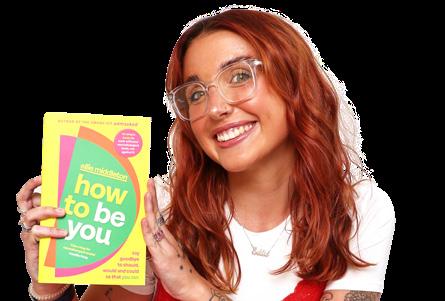

An activist and speaker, Ellie Middleton can be found on LinkedIn and TikTok with bitesize tips about how to live your best #AuDHD life. She tells us all about her new book, How To Be You.
Q What do you think could be done differently to help young neurodivergent people and why?
AI think up until now, the only time that doctors or teachers would look into if someone could be neurodivergent is if they are struggling. If someone is struggling at school, struggling to focus, and their grades are slipping, they might get assessed for ADHD, or if someone reaches a crisis point with their mental health, if they are lucky, they might get referred for an Autism assessment. But we never proactively consider neurodivergence in young people who aren’t showing as many external signs of struggle - maybe they
I think the biggest thing is just letting go of shame and the idea of how we “should” do things.
are high masking, or maybe they have a level of support which means their challenges aren’t so obvious. I think all young people should be screened for different neurodivergences at a certain age, rather than waiting until they reach a crisis point so that we can support people before things get so difficult.
Q Would it be fair to say that society needs to be more accommodating to neurodivergence?
AAbsolutely. I think we’re definitely making progress in that more and more people are starting to have conversations about neurodivergence and have a certain level of understanding, but that often doesn’t translate into people



actually being accommodating in practice.
Q With this in mind, what helped to shape your second book?
A I was very aware of the fact that although more and more people are starting to get diagnosed with Autism/ADHD or realize that they are neurodivergent, there’s still so little support for people to access. Either people can’t get a diagnosis because of huge waiting lists on the NHS, or once they are diagnosed, they are sort of “diagnosed and dumped” - so they get the diagnosis and then are left with no therapy, support, or [any] sort of “handbook” on what to do next.
I think all young people should be screened for different neurodivergences at a certain age, rather than waiting until they reach a crisis point, so that we can support people before things get so difficult.

So, I wanted to create a practical guide to help people learn how to work with their brains, rather than against them - and How To Be You was born!
Q What does your writing process look like?
AVery ADHD! I usually have a hyper-focus period at the start where I have loads of ideas and get a few chapters written really quickly. Then, this is followed by a lot of procrastination and struggling to sit down and actually get it done - and then once the urgency of my deadline hits, a big final push!
Q How did you manage Autistic burnout and how did you get back on track?
AI think it’s a really ongoing process and definitely never easy. I’ve been making a really conscious effort to slow down on a daily basis rather than going at 100mph and then having a big crash.
Q In respect of your second book, what do you think are the key things you have learned about how to cope with the challenges of being neurodivergent?
A I think the biggest thing is just letting go of shame and the idea of how we “should” do things. If you stop forcing yourself through all of the things you think you “should” do and doing everything in the way you think you “should” do it, and instead just do the things that work for you, in a way that works for you, things get a lot better.
QWhat advice would you give to your younger self?
AFocus on the ones who love you, rather than the ones who don’t!
How to be You: Say Goodbye to Should, Would and Could So That You Can by Ellie Middleton is out now.
So, I wanted to create a practical guide to help people learn how to work with their brains, rather than against them -
and How To Be You
was born!



Our editor read How To Be You - and weighs in with her thoughts:
Curiosity is a kindness - and in today’s world, we could afford such a state of grace more often to other individuals. Our own experience is usually seen as the default, prescribed ‘norm’. This is not the case - and Middleton poses the question of what would happen if we worked with a brain, rather than against it. For a Neurotypical portion of the population, this is likely a revelation; those in a position of care should be thinking long and hard outside of their arbitrarily imposed limits. Why ‘should’ we follow the set rules that lack reasoning or logic? Neurodivergent diagnoses aren’t ‘on the increase’, and anyone wanting to know more should start with this basic principle.

When it comes to Christmas, inaccessibility can be quite a daunting, stressful prospect. Disability Review Magazine has pulled together a list of pull-out resources to help you during the festive season.
Can we be totally honest about this? At the best of times, Christmas can be stressful - but it becomes even more daunting when you add in inaccessibility.
While it is not a total ‘solve all’ list, here at Disability Review Magazine we believe in the power of information - and how that can be used to negate some access challenges. We have rounded up our best festive resources and tips, in something of a whistle-stop tour:
1
The internet offers up a lot of information - and that includes around accessibility. AccessAble offers a range of guides that spell out the access arrangements in place for thousands of venues; if you log on at Accessable.co.uk, there will likely be a result that can help you.
2
Book assistance if you can
While you do not have to as it is your legal right to just turn up, sometimes booking assistance can take out the stress of a ‘round’ trip. Passenger Assistance is one such app that can help you; other providers have their own arrangements, so it may be worth always looking online. If you are going away via plane this holiday season, most airlines have their own provisions in place. The Sunflower Lanyard is recognized by a range of places, so it may also be worth picking up a lanyard for yourself.
3
Think about ‘peak times’
When it comes to peak times, it may mean that access becomes an issue - such as when it comes to overcrowding. (And sometimes, tickets to events are cheaper outside this time bracket!)
4
Ask for your reasonable adjustments outright
Reasonable adjustments are a basic right when it comes to the physical reality of having a disability; this was enshrined by the Equality Act in 2010. If you’re going to a venue for an event such as a meal, sometimes there are online booking forms; additional requirements often have a box where you can state your access needs. If you are a Neurodivergent individual, ask to be seated in a quiet part of the restaurant; if you need access to a bathroom, ask to be seated within walking distance. (Editor’s note: I can recommend Dishoom - I had the best accessible experience there, and would wholly recommend it to anyone.)
5
Make it visual
Sometimes, we need to think ‘outside the box’ - because our assumed experience is not the reality for everyone else. When it comes to Christmas time, such as in the world of SEN, the assumption of ‘just going with the flow’ can be utterly terrifying, as well as provoking a lot of anxiety. So, make ‘it’ visual - put a whiteboard out with a structure for the day. The app Tiimo can also help with this, as well as building specific routines.
Mariah Carey is defrosting, and Michael Buble hangs in the airit’s Christmas time! But what about accessibility when it comes to purchasing gifts? Here at Disability Review Magazine, we have put together an accessible Christmas gift guide.
Let’s be brutally honest about this; sometimes buying gifts can be very stressful, especially in the mad rush up to Christmas. And the options that are sometimes on offer are not always the most ‘accessible’ option either - either by price point or in line with relevant access needs that somebody may or may not have. Disability needs and should be celebrated - after all, that is why we put a theme of ‘celebration’ to this issue.
In this guide you will see a range of accessible gift ideas; there is a mix of price points, and some of these are also from disabled business owners. We have tried to cover as many different conditions as possible in the options available in this guide, to offer up something for as many people as possible.

Depending on who they are for and their age, there are many disability-specific books you can give as Christmas presents. (We even featured some of them in this issue!) These are 5 titles that we would recommend:
Ruby Hastings Writes Her Own Story by Rachel Charlton Dailey
Crippled: Austerity & The Demonization Of Disabled People by Frances Ryan
Stumbling Through Time & Space by Rosemary Richings
The Little Book Of Ableism by Victoria Jenkins
Living With Hearing Loss And Deafness by Samantha Baines
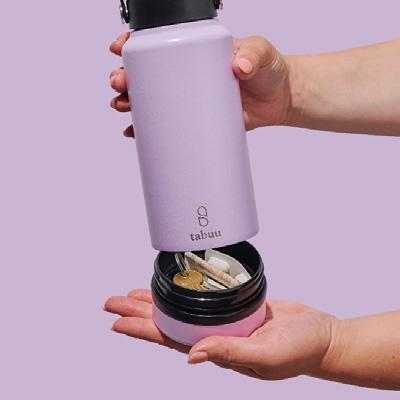

Deafmetal - Deaf
Beautiful with Samantha Baines
Samantha Baines is an actress and author, among multiple roles that she inhabits; she is also a jewelry maker! Deaf Beautiful is a hearing aid jewelry collection that she and Deafmetal have designed. Each piece would also secure a hearing aid to your ear. The designs include the inclusion of an ‘Irish promise’ on one design, too. Visit deafmetal.store/category/24/deafbeautiful-with-samantha-baines for pricing information.
The Tabuu Water Bottle
Some of us need to carry liquid around with us, such as if we have a Chronic Illness. There are always ‘extras’ to account for when disabled - and sometimes, discretion is the name of the game. The Tabuu water bottle comes with a secret compartment at its base, making it an ideal place for storing medication or snacks - and there is an easy-to-use, convenient handle to use. And Tabuu also offers pill cases, too! Just visit wearetabuu. com to find out more, and to choose your favourite colour in the range.

A Christmas Carol (ish)
Soho Place is one of the youngest theatres in London, and it offers an exciting new range of performances throughout the year. A Christmas Carol (Ish) is exactly what it says - in being a retelling of the classic Charles Dickens story - and is appropriate for children aged ten and over. This finishes on 31st December; there are also BSL, audio described, and live subtitled performances on offer. Visit sohoplace.org/shows/achristmas-carol-ish for more information.

When it comes to decoration, we love to see inclusionand this is a creative way of achieving exactly that. Dotty About Braille offers a range of products, and that includes these braille-incorporative designs that would suit any Christmas tree. A multiaward-winning business, Dotty About Braille also offers greeting cards and transcribed documents. Visit dottyaboutbraille.com to purchase.


On our 2024 change-makers list, we nominated husband and wife Hester and Kelly Grainger; they both run the neurodiversity consultancy firm Perfectly Autistic. Hester is a later diagnosed ADHDer and will be taking a show on the road in the middle of next year. An honest look at life with ADHD, there will be honest and refreshing takes, laughter, as well as open conversations. Starting in May, venues include London, Essex and Glasgow. Visit mapletreeentertainment.com/currentlytouring/ADHD+Unmasked/36/summary/ for tickets.


Are you looking for a place to stay, or to book a weekend away for, say, you and a partner? In this issue our editor went to stay at the Pan Pacific Hotel in London - and, as it turns out, she had a lot to say about it. We would recommend this as a getaway location - and the access arrangements were at the heart of the experience, too. That is not something that you can say sometimes; earlier this year, we delved into travel, and how that can have a negative impact on the disabled community, to merely

Sometimes, disability can feel utterly overwhelming - and it often comes with mobility aides that are grey, functional, and just, well, a little bit boring. Where is the self expression in that? Sometimes, we all need to express ourselves just that little bit more! And NeoWalk offers the perfect option to do exactly that; you measure yourself up, choose the design of your cane (including the handle shape), if it can light up - and add the accessories to match. Prices vary, but if you are a long-time mobility aide user, this is the place to visit. The designs are sturdy, durable - and there is a wide range of options for all major preferences. Visit neo-walk. com for pricing information and the full range of designs.

Why do I like New York? A city of a million lights makes room for the contradictory nature in human beings.
By Lydia Wilkins
When Christmas comes to town, America goes ‘all out’ - and the access is supreme.
New York City always seemed akin to a dream when I was a child - because, after all, how does a little girl get to go across the pond, to the other side of the world? By the time I reached my twenties, the ‘travel bug’ had got to me - and this was one place that was always going to be on my travel list.
For obvious reasons, 2020 was a wild year; I had gone across to New York, my first ever solo flight, as part of a twenty first birthday present. For the first time
in decades, New York was silenthardly the city that never sleeps! A gradual shutdown of all services and entertainment organisations had begun. Broadway would fall quiet. Tiffanys would equip their doorman with a cloth to not touch a thing - of course in brand colours, likely cashmere. Others found humour in a rapidly developing situation. Chalkboards outside bars dotted the sidewalk. Ostensibly, you too can Beat The Coronavirus! With Happy Hour! All in exuberant capitals! Even now, this still feels like a whole other world.
I am an introvert, with a real need to be alone. I work from home, all my working life I have been freelance, and I tend to avoid groups like the plague. (Yes, the Autism diagnosis was not exactly a surprise as a teenager.) However, total silence at home is just impossible - you’ll be finding me playing rock music while I write! The harder the better. Led Zeppelin, Queen… All are on the playlist.

Landing in New York two years ago felt like a fever dream. The other side of the world seemed… more world weary, in a post Covid world. But America will never change, not really. Christmas? Bah! Go big or go home! Make it colourful! My trip was on the dot of December 1st - and a transformation had begun. Nutcrackers as big as houses watched the sidewalk, decorated trees were stuffed into very possible corner, light displays of every kind were simply everywhere. It was hard not to stare - every glance is


The avenue screamed money - along with expensive taste.


a photo. Then, catastrophe. Barnes & Noble saved me however - an oasis of sanity. The UK use to have a tradition of Christmas lights being switched on; as a little girl, I remember how celebrities would often make appearances, with a lot of fanfare, to merely flick the switch. The US is on a whole other scale! And boy, was it loud

I’d come in from exploring Central Park; I just adore the Zoo, especially the open enclosure which allows for exotic birds to fly around. They were mere inches away! And the seals would put on a show! (Yes, I was a kid again.) Coming up the avenue, the entirety of the New York Police Department seemed to be out in force - including one comically tiny officer, left to direct traffic with what seemed part of a plastic barrier, owing to a traffic light failure. The rain was cold, biting. Too many people! Too much! The overwhelm! It’s real! It was time for the avenue’s Christmas display - a
light switch on, and associated display. Shops such as Cartier had their shop fronts decorated in the most exquisite of materials - wreaths, expensive swatches of fabric, more for the displays. The avenue screamed moneyalong with expensive taste. Some parts of Kensington in London are similar, but this was on a grand scale that the UK could never compete with. Then, it began.
Lights! Animated lights! Sound! It was everywhere. The city turned itself on - and the sound was immense. With an ongoing crowd still in motion, and a body only slightly recovered from a Covid 19 infection, it was all just too much. Christmas carols were so loud that to hear yourself think was a challenge. What do we do when the going gets tough?
We dive head first into a bookshop, and we stay for many, many hours. Barnes & Noble is an elite bookshop of anyone’s choosing, along with others such as Daunt Books and Shakespeare & Company. The physical access was brilliant. And it was quiet! A perfect way to wait for the changing of a crowd! There is a space for every kind of person in New York City, even if their needs are not just physically ‘obvious’.
That day, I found Alice Wong’s newly released memoir - and it was International Day for Person’s With Disabilities. I remember it far too well, in being instrumental in my journey in accepting myself, and my new chronic illness. It’s a city I shall forever love.



Our editor spent a night at the PanPacific hotel in London while paying attention to the new accessibility features, just in time for Christmas.
That is the chicest walking stick I have ever seen!” An enthusiastic proclamation of sorts, I can’t help but smile to myself. Whenever a company or organisation starts to speak about accessibility, I always feel just a sense of panic - as usually, it is not executed at all in good faith. I may have a sparkly cane to walk with, but it is not a signal for tokenistic social kudos. I am always just that little bit apprehensive. I always want to be proven wrong - and reader, how wrong I was.
That is the chicest walking stick I have ever seen!
From the moment of stepping foot into the Pan-Pacific Hotel, just outside Liverpool Street Station, I was beyond pleasantly surprised - even with the enthusiastic love of my cane. (It has sparkles named after the Northern Lights - and it lights up.) First, the road-facing entrance is accessible; the ramp is built into the marble floor, and there are plenty of wheelchair accessible spaces to transfer out of. That’s sadly too rare to see, even more than a decade since the passing of


Inside and out, what’s immediately striking is the abundance of foliage.
the Equality Act. We just would like to sit in the courtyard! And how refreshing.
5 reasons to book a stay at the Pan-Pacific Hotel:
Rooms are available with a hoist
The accessible bathroom on level - 1 has a toilet and sink that are heightadjustable
A ramp at the entrance is a default option
Open spaces
The quiet atmosphere
Inside and out, what’s immediately striking is the abundance of foliage. In the courtyard, there is a sprinkling of colour - but in all internal settings, there is just so much of nature. Art and plant life collide in such a wonderful way. The lobby for check-in is autumnal themed, perfect for winter. One of the bars ‘upstairs’ is in pink. And then the fun begins. I’m given a tour of the access related features by the staff; Butler Jasper is on the case! (And if his boss is reading this - he’s brilliant, and should be given a raise.)
To access the seating area on an elevated floor adjacent to the check in/reception area, there is a discreet lift to avoid stairs if needed. Blink, and you would miss it - because the access has been taken as a ‘default’ as part of the design. Most individuals should be able to manage this independently.
On floor -1, I was shown the accessible bathroom. A member of staff also told me how a disabled
customer had inspired these sweeping renovations - after a stay of more than forty days, no less. This is by far the most glamorous bathroom I have ever seen. As a disabled woman, I also have my own vanity habits - especially lipstick - but rarely if ever do accessible bathrooms have a mirror. And if so, it’s usually tiny - you need it to adjust your outfit, to see the awkward angles around the body. There were two (!) mirrors and the sink and the toilet itself were both height adjustable! Why is this not standard everywhere?! I often want to bring my friends with me, just for socializing reasons - however, it can sometimes not happen at all, just because access is a nightmare.
As a disabled woman, I also have my own vanity habitsespecially lipstick!
The sheer mental load of having to prepare every single detail, to call around, and to advocate for yourself, can take a lot of fun out of what is supposed to be a fun evening out. Now, this is raising the game. Why aren’t more companies doing the same?

There is space! So you can freely move around! (Owing to the damage wrought by Covid 19, space is important to me - as too much or too little presents a problem.

For the sensory wellbeing element of your stay, there is a pool that can be accessed through a platform that can be operated independently or with assistance.
Back in my room, I was taken abackbecause this was the first time that I had felt like I’d been truly thought about, as a consumer. There are rooms available with a hoist at the Pan Pacific - and the specifics can be found on the hotel’s website.

There is space! So you can freely move around! (Owing to the damage wrought by Covid 19, space is important to me - as too much or too little presents a problem. My spatial awareness has never been the same, the cane means I can walk about without becoming ‘locked’ to the floor. It’s not fun.) Discreet buttons by the bed mean that you can operate the curtains - half mast or fully closed? And the lighting has four settings, all operated within easy reaching distance. This is a detail I liked, again for the reason of spatial awareness; darkness has an impact, and trying to navigate means a lot of bruising ‘happens’. It feels like a lot more autonomy has been restored to me. At the time of writing, it’s suspected I may have POTS due to the Covid 19 infection. If I shower, I need to sit down; getting in and out of a bath is incredibly difficult for me, and takes a long time and a lot of energy. For the first time, I was able to use a shower chair - and it was firmly

fixed to the wall. For the first time since coming out of quarantine, taking care of myself has actually felt comfortable - and not like I am going to pass out. It’s comforting that there are three red cords in the bathroom alone, all reach the floor as regulations state - and there are two others in the rest of the room, too.
I was also impressed by the awareness of allergies, and how this was catered to. Sometimes disability comes with food access needs - and this should not be ridiculed. I like that the menu was clear, and it also had the allergens clearly marked out. This is the future for access. And now is the time for this to be everywhere.
There are rooms available with a hoist at the Pan Pacific - and the specifics can be found on the hotel’s website.
To book your stay, please visit: panpacific.com
Christmas is coming! And with that there may be some extra travel involved. These are 5 accessible locations Disability Review Magazine would reccomend to anyone to visit at Christmas time or in the New Year.
If we ever had a wish, it would be that travel was as accessible as it can possibly be to every disabled person. It should not be a privilege - but a right. And it takes so much extra energy that we may not often have, with extra planning, ringing around, asking for recommendations, and more. The UK and Europe have a lot to offer when it comes to accessible travel - these are just some of the highlights we found while traveling this year:
1
Quiet, colourful, and largely flat? Rotterdam has a firm place on any accessibility list. Be it Markthal or Stad Huis, this is an ideal city break destination - especially for the gap between Christmas Day and New Year’s Eve. There’s a large shopping centre and plenty of tourist destinations, plenty of places to eat, as well as more scenic routes to boot. Markthal always has a scenic theme, and there are so many pretty lights to match.

2
Love a loud environment? Amsterdam has got you covered! A raucous contrast to Rotterdam, it can be quite a party town. While there is a lot to be desired when it comes to cobblestones - and yes, this does mean there needs to be a degree of planning how to get around - there is so much not to miss out on. There’s shopping, tiny bistros, history - a brilliant place to revisit, time and time again. There are also places such as Kukenhoff, known for the abundance of flowers you can photograph.

3
When it comes to the holiday season, London likes to go ‘all out’ - and is not to be missed. Oxford Street usually has the Christmas lights up by the beginning of October; John Lewis also has a popup Christmas shop. But there’s also a degree of sanctuary on offer, with quiet places, too. The Imperial War Museum is worth a visit - sometimes just for a few times a year.. - sometimes just for
a ‘time out’ - in Lambeth North. This is one of the most accessible institutions in the capital.

Each March, the NEC plays host to the UK’s biggest annual disability conference. Naidex is not to be missed! Birmingham is worth exploring - and there are enough places to sit down and rehydrate, which is great for access. There’s the Bull Ring, a Christmas market, multiple historical landmarks, as well as ‘one day’ type events throughout the rest of the year

5
If you’re looking for a place to stay in London, the Pan Pacific hotel is one such destination to check out. In this issue we took a tour of the new and improved accessibility features - and our editor, for the first time, was asked if she needed a hoist. It shouldn’t be notable because access should be a standard ‘given’ — but this was such an accessible experience.

Credit: Caterina Edrich & Friends



DRM’s resident travel columnist Carole Edrich interviews a representative of this year’s Venice Biennale celebration.
Every time the Venice Biennale, a celebration of architecture and art, takes place, the British Council chooses a select group of people to represent the UK at the British Pavilion. The representatives act as stewards and are given funding to develop their own creative and scholarly projects. Those selected for this year included artists, critics, public educators, mental health professionals, entrepreneurs, philosophers, a peace negotiator…. and Caterina Edrich, a jewellery student at Birmingham University. Thrilled to discover this (I’m her aunt), I set out to interview her.
Q How would you describe yourself?
A I’ve genuinely never been asked that before! I’d say I’m kind of interesting, kind of boring, you know? I’m creative, I’m quite sporty and I’m good at chatting with people, but sometimes I’m also terrible at it.
Q How do you view your current creative journey?
A Right now, I’m exploring different media and production processes. I mostly focus on textured or conceptual pieces for what I’d call creative projects. A lot

I’m glad I pushed myself to apply because now I feel more confident about putting myself out there
for future opportunities.
of my work is about identity, often reflecting my own self-identity, life as a neurodivergent person, and my cultural influences. But this isn’t set in stone. I’ve only been at this for three years, and each year it changes.
Q What drew you to apply to represent the UK at the hugely prestigious Venice Bienalle, and what does it mean to you?
A I saw a post about the opportunity. It sounded cool, so I applied. I’ve always been scared to apply for things like this because I never think I’ll get them. But I realised that even if I didn’t get selected, the practice would be worth it. I’m half Italian, half British, and I thought representing both cultures would be a good fit, but I never expected to get chosen! Now I’ve done it, it still feels surreal. I’m
glad I pushed myself to apply because now I feel more confident about putting myself out there for future opportunities.
Q Could you tell us a bit about your journey into jewellery design?
AI was really young. On my 8th birthday, my parents organised a jewellery-making party. Just beads on a necklace, nothing fancy. But they bought me some proper tools as a gift, and I got really into it for years. By the time of my GCSEs I had forgotten about it, then during lockdown when school was online, I got back into jewellery. School-work procrastination was wire-wrapping. Before COVID, I wanted to be a Spanish teacher but I didn’t know what I wanted to do at uni. I even lied that I wanted to go to art school! Mum eventually signed me up for the British Academy of Jewellery in Birmingham (BAJ), and here I am.
Q How has studying at BAJ influenced your approach?
A It has completely changed everything. Before BAJ, I wanted to just make jewellery, maybe do a little bit of design, but nothing major. After doing random experimental pieces for my application process I switched from a focus on bench skills to design. Now, I’m exploring materials in ways I never imagined. The facilities here are insane! I have access to tools and machines that cost thousands. It’s probably the best workshop I’ll ever have in my life. With all the support and resources, I’ve been able to explore so many things. Every project is an opportunity to try something new.
Q How did you feel when you found out you had been chosen to represent the UK at the Venice Biennale?
A I was delighted! Just being in the interview round was fantastic. I never imagined I’d get selected. When I got the news, I was just like, “Oh my God!” It didn’t feel real until I was actually in Venice.
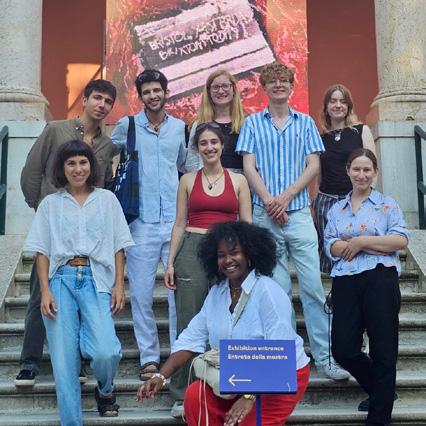
Before COVID, I wanted to be a Spanish teacher but I didn’t know what I wanted to do at uni. I even lied that I wanted to go to art school!
Q What did you most enjoy showcasing?
AI’m excited to showcase how my work reflects contemporary British art and culture. Although to be honest, I’m still figuring out what that means.
Q What does it mean to you to represent young artists with ADHD on a prestigious international stage?
A
It’s pretty cool. I didn’t think much about it initially, but now it feels nice and makes me proud.
Q What has been the biggest challenge in your career so far, and how did you overcome it?
A ADHD, hands down. It affects everything, from balancing study and work to managing time effectively. I’m still figuring it out, but I try to focus on the things I can control and seek help when I need it. ADHD makes everything harder, especially when it comes to routine and time management. The creative process is all about exploration and experimentation, which doesn’t really lend itself to structure. I feel all over the place most of the time, and it’s
hard to stop when I should. ADHD helps with random idea generation, but it also means I end up with loads of prototypes and not enough time to finish my final pieces properly. I never quite manage to make them as well as I want.
Q How do you manage or balance the demands of studying, creating, and preparing for events, especially with ADHD?
A
It’s a struggle, honestly. I’m constantly doubting myself, feeling like I don’t belong in either jewellery or art, but I keep pushing through. The key for me is to take it one step at a time and remind myself of my accomplishments.
Q What are the most important themes or concepts you aim to explore in your jewellery designs?
AEmotions and personal experiences are at the core of what I do. My work divides into two main categories: aesthetic-driven and concept-driven. Aesthetically, I’m inspired by everyday life, especially light and water and how they interact. For example, I once did a resin ring inspired by how light
ADHD makes everything harder, especially when it comes to

distorts through ice. Conceptually, I explore identity, like my family stacking rings, which represent who we are, or pieces inspired by neurodivergent experiences. I’ve done work exploring my own identity as someone with ADHD, and I’m always branching out from my personal experiences.
Q Is there a particular piece of jewellery you’ve created with special significance?
AYes, definitely. I never take off this silver ring. It’s the first proper piece of jewellery I made in metal, my first wax carving, and I got it cast for my birthday. It has my sister’s and my fingerprints inside, so it’s really special to me.


Finally, what’s next?
I’m currently working on my final year project, which is really exciting. I’m also planning to apply for more opportunities, both in the UK and internationally. I don’t know exactly what the future holds, but I’m looking forward to whatever comes next.
AUTHOR: Carole Edrich, photographer, journalist and board member for Unlimited and is also a resident travel columnist for Disability Review Magazine.
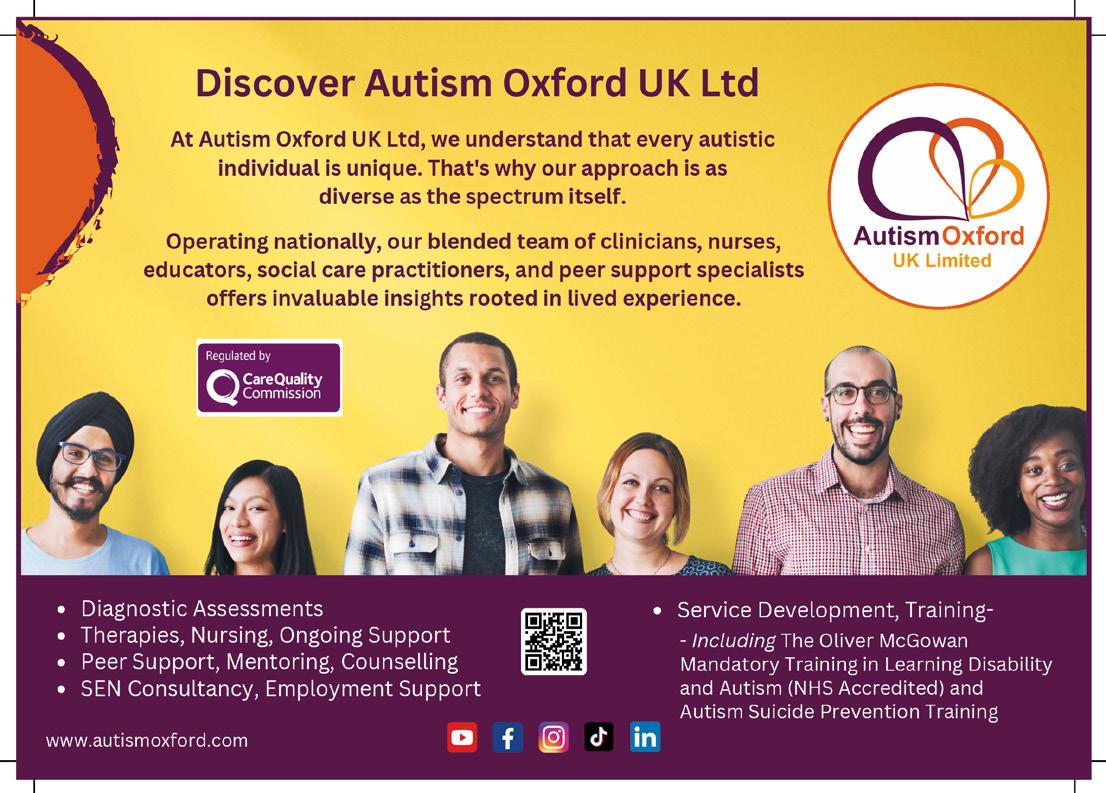

A lot has happened in the disability space this year, yet the same old problems of disability discrimination remain. 2025 beckons - so DRM has put together a manifesto of changes they want to see next year.
If ableism is the discrimination against a disabled person on the belief that one ability is better than another, in being inherently superior, we have a long way to go as a society. Disability is something that will come to impact us all in the end; it is just another way to live. It should be considered with nuance and with self-compassion at the very least. If we see ourselves through the extreme binary lens of tragedy vs triumph, this serves no one - we need to see the ‘bit’ in between, and to ‘hold’ those complicated feelings.
Among the headlines, the voices of disabled individuals have been somewhat lost.
To be disabled is a complicated place to be in the 21st century. We have seen that with the UN condemning the treatment of disabled folks in the UK once again, cases where the police have been taken to task for harm caused, a spotlight on those who have ME, and an underprepared healthcare system left to just… well, seemingly float in an abyss. Among the headlines, the voices of disabled individuals have been somewhat lost. 2025 is another year, another chance for us to be heard - and to have a say. We asked a handful of leading disabled voices as to the changes that they wish to see take place in the next 365 days.
A lot has been said about energy limiting conditions this year, particularly with a

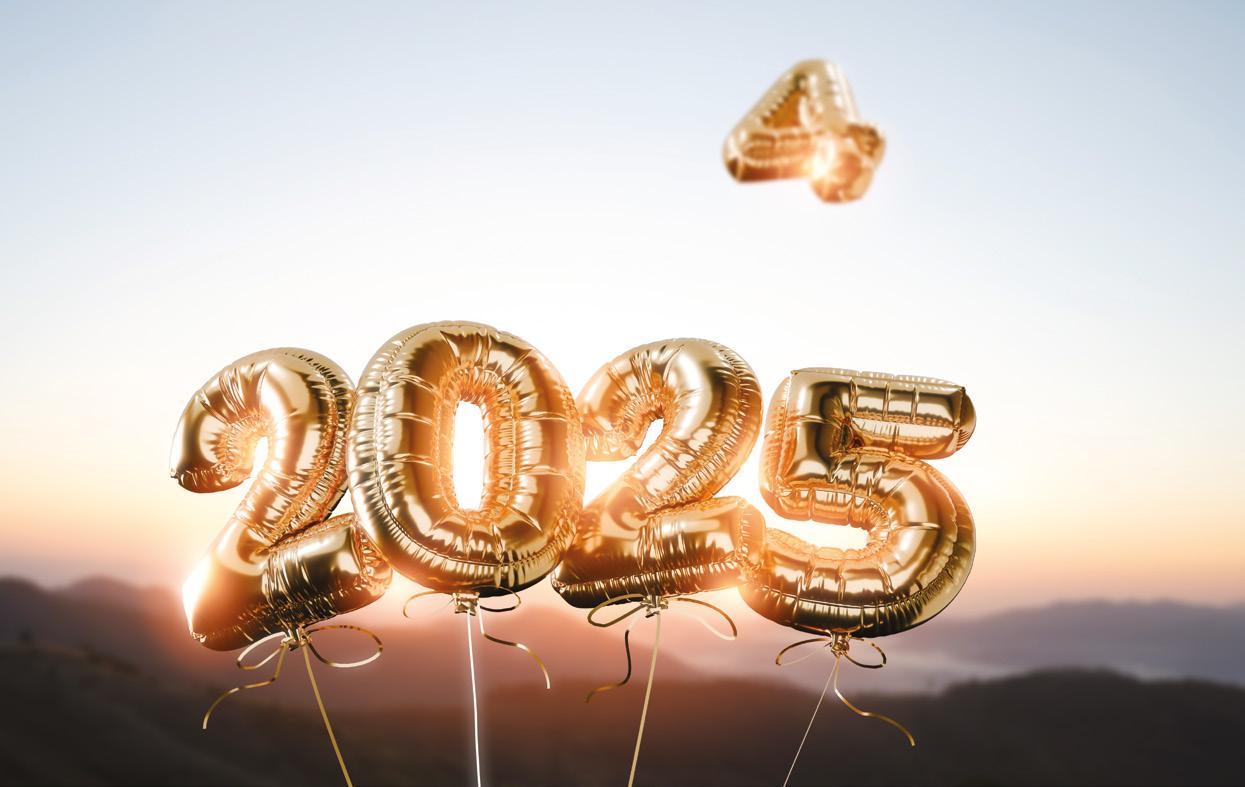

I really hope to see more recognition of Energy Limiting Conditions (ELCs) in the disability community.
Pippa Stacey, writer and speaker
very public inquest that spotlighted the death of a young woman while in hospital; the care for patients across the UK who have ME was highlighted as simply not being good enough. Provisions are more than just lacking. ME is not just ‘I feel a bit tired today’ - it is encompassing, debilitating fatigue.
Pippa Stacey is a disabled writer and speaker; she is also the author of How To Do Life With A Chronic Illness. When asked what she would like to see change in 2025, she said: “I really hope to see more recognition of Energy Limiting Conditions (ELCs) in the disability community. Those of us with chronic illness and debilitating

find a sense of belonging in the social model [of disability], but the emerging concept of ELCs gives us a language and framework to express ourselves, and our access needs and ensure we’re part of the movement towards inclusion too.”
Disability encompasses a range of experiences - it is neurodiversity, acquired conditions such as from an accident, energy limiting conditions, more. The binary idea of disability being one set idea - usually, this is thought about with the image of an individual solely using a wheelchair - does not reflect the nuance of a community. There needs to be a greater recognition of what disability means, and how it can be seen.
Stigma is created by shame; better representation is needed
Continuing with the theme of nuance: media representation is often coached in ‘tragedy or triumph’ terms. Disabled individuals are allowed to exist as themselves, without having to be seen or live in an extremity. We are not heroes or villains - we are people, too.

There’s so many different experiences of being disabled that it’s just it’s utter madness to think that one, one thing covers everything.
Ruth Madeley, actor and writer
Rachel Charlton-Dailey is a columnist for The Canary, and is the author of Ruby Hastings Writes Her Own Story. She believes that a reform of standards in traditional media when it comes to disability stories is crucial - and that she wishes to see this in 2025.
She said: “The major change we need is press reform. Public perception of disabled people can’t change while the press is allowed to constantly call us work-shy scroungers or superheroes. We need a complete overhaul of the way the papers write about us.”
Education comes with boundaries
In this issue we spoke to Ruth
Madeley, an actress and writer known for landmark roles in dramas such as When Barbara Met Alan and Doctor Who. Part of our interview - and if you haven’t read it, go back and do so! - explored the idea that a disabled person is often expected to act as an ‘educator’. Invasive questions are ostensibly to be expected when out and about in public; education and the role of an educator can be executed with boundaries. Besides, one disabled person does not reflect the nuance of disability, either, let alone every single person with the same condition.
During the interview, she said: “See, what people think disability is one thing, which is why having
more disabled stories on screen is so important - because my experience as a person who was born disabled, who is an ambulatory disability user, is incredibly different from somebody who’s autistic, who’s deaf, who was, paralysed in an accident, who’s blind. There’s so many different experiences of being disabled that it’s just it’s utter madness to think that one, one thing covers everything.”
Questions can be asked with kindness, as well as politeness; asking “What happened to you?”, or even “What’s wrong with you?” is as invasive as it is cruel. It’s also an unreasonable expectation when there is access to a myriad of resources elsewhere - including Google, your local library, or even just social media.
Here are 5 quick ways to assist the disabled community in 2025 and beyond:
Resources. You can always Google, tap into social media, read up on disability - we have a list in this issue of great book recommendations.
Make time to listen to your disabled friends and family.
Keep on engaging with disability media and small businesses.
Listen to us carefully. If we tell you we are in pain or are uncomfortable, please believe us.
Everyone makes mistakes, it’s how we learn from them that matters.
By Lydia Wilkins
Disability is becoming more ‘mainstream’ in publishing, with more books covering the topic than ever before. These are the books by disabled authors you should be putting on your Christmas wish list
right now.
Ihave always considered myself to be a ‘bookish’ person - enough so that I can’t remember the ‘before time’ of when there wasn’t a trace of books in my house. 2024 has been ‘the’ year of disabled authors - and that is set to continue into the new year, which is so wonderfully brilliant and exciting all at once. I have put together a ‘top 6’ list of books to put on your Christmas list for this very reason.
The Little Book Of Ableism by Victoria
Jenkins

If we can name a problem, then we are halfway to a solution. Ableism is the belief that non-disabled individuals are superior to disabled people - and this is a book written to confront such an ideology.
Disability Intimacy edited by Alice Wong

Alice Wong has collated and edited a selection of writing to look at the concept of intimacy and disability - such as the relationship between partners, caregivers, and even small acts such as adopting a cat. A wonderful volume for any shelf.
To Do Life With A Chronic Illness by Pippa Stacey

Chronic illnesses can be upsetting when acquired; there is a lack of information as to how to ‘do’ life. In our last issue, we interviewed the author Pippa Stacey; this should be mandatory reading or a gift at the point of diagnosis. A ‘hug’ in book form.
How To Be An AntiAbleist by Tiffany Yu

Tiffany Yu spoke to us for this issue about her book, which is already out in the US. A long-form guide of the TikTok series that went viral during the worldwide lockdowns, this is a guide as to how to be a better ally to disabled people. It is sure to become a much needed volume to a workplace looking to better its DEI practices in due course. Out on March 6th 2025
I think that for far too long, we have become even more polarised, at least here in the US, probably also in the UK .
Interview with Tiffany Yu on page 24
Who Wants Normal? by Frances Ryan

Frances Ryan debuted with what was called a “blistering polemic” of a book that took on the impact of Austerity policies on disabled people through the use of first person stories. This book is a look at disability and feminism, in examining what it means to grow up to become a disabled woman. Out on April 3rd 2025
Ramping Up Rights by
Rachel CharltonDailey

A follow up to her children’s fictional debut, Rachel Charlton-Dailey will be releasing her next book on a yet-to-confirmed date next year. A full length book intended for an adult market that centres around disability, we will be sure to update you all about it in our next issue.
“WHY DO MEDICAL
HAVE TO BE TABUU?”
Lucy Rout poses an important question. And she decided to do something about it. Tabuu is her online company that sells stylish pill cases - as well as the newly adapted water bottle. She tells Disability Review Magazine her story. As told to editor Lydia Wilkins.
Ihad a reconstruction of my digestive system, age 25, to remove a pancreatic cancer, which left me with kind of, yeah, a newly disabled body, which has various quirks and foibles to it. But ‘the main one’, the main crux is that I now take medication, with food every time I eat, and I will be doing so for the rest of my life.
“And Tabuu started for a couple of reasons. Number 1 is I noticed that when I was going into public and social settings, I felt a bitand this was ableism on my part - but I felt a bit embarrassed about getting my pills out in public. I felt a bit awkward. I found myself kind of apologising for taking them out. I found myself getting some quite weird comments from people commenting on either my eating habits,
All of the products in the market were very medical and very grey and very functional.
or me taking medication, which I just thought was a bit odd. So I searched the market everywhere for something stylish and practical to carry them in that would just kind of, you know, it’s gonna sound really simple and ‘basic’, that would just look nice and feel nice to carry and make me feel a bit more confident, that my pills were well looked after and that would, you know, [remain] stylish in my handbag and I could just kinda pop them in my bag and get about my day.
“To your point earlier [from before we started recording], Lydia, you know, all of the products in





I’m personally always forgetting my water, which can be a bit of a nightmare because then you’ve got the situation of needing to run into a bathroom and drink out of a tap like a cat.
the market were very medical and very grey and very functional. I think those products serve a wonderful purpose, particularly for our communities with lower dexterity or for the people that need those slightly bigger products. They’re brilliant, and they work really well. But that market isn’t a one-size-fits-all. There are lots of us who take medication for different purposes who want slightly different products, that are a bit more stylish and a bit more functional and designed with our needs in mind. So I decided to, from my bedroom, whilst doing my full-time job, to start designing my first ever product, which was my first ever Tabuu pill case, which is sort of a daily weekend pill case.
“Tabuu now comprises 3 products. So we have a daily pill case, which is a stainless steel key ring pill case, which you can attach to your key ring or your lanyard or your invisible disabilities lanyard, whatever you like, and you can keep pills inside. Then we have a weekly pill case, which is a 7 day pill case, which effectively is perfect for everything from vitamins to supplements and helps keep everything organised across Monday to Sunday.
My fundamental belief with building this business and continuing to do so is that everyone deserves access to beautiful, stylish products that represent their needs.
“And then, my dream, which recently just launched, is the water bottle. So it’s called the Tabuu bottle, and it’s a stainless steel water bottle, which holds 760 millilitres of liquid. And in the bottom, there’s a top secret removable compartment, which is perfect for everything from insulin to medication, to sweets for those who perhaps might be diabetic and need to carry glucose with them.
“But, also, it takes us into a wider market for people who just, are
looking to carry things like their keys or their headphones, take some money out on a walk with them. It’s got a handle, so I’ve got lots of babes who’ve been attaching it to their wheelchairs as sort of an easy way of carrying it.
“I’m personally always forgetting my water, which can be a bit of a nightmare because then you’ve got the situation of needing to run into a bathroom and drink out of a tap like a cat. So, yeah, it’s sort of just trying to design sort of something that combines the functionality of needing water, but also, having somewhere, as I say, sort of discreet and elegant where you can keep the medication, keep it safe and dry, and hopefully

just, yeah, be able to design something for people that just deserve better. My fundamental belief with building this business and continuing to do so is that everyone deserves access to beautiful, stylish products that represent their needs.
“And I think that’s true, you know, regardless of chronic illness or disability, it doesn’t need to be this, you know, grey medical world. It can absolutely - there is absolutely space in the market for someone to make these things a bit more stylish and functional and beautiful because, yeah, I think, you know, we all deserve access to beautiful products, and that’s kind of what my business is trying to do.

“I’m speaking with some retailers and things at the moment because I think a big part, of kind of my vision and my dream is I want everyone in the world, which is obviously a big goal, but to be able to go into a store and see products on shelves that represent their needs. I think, again, if you look at the category of medical devices, you know, we’re stuffed away in the corner somewhere in this grey little bottom-of-the-shelf thing. So one of my real goals with the business is to bring, you know, these products for people like me and you and our fellow mates in our communities that need these things front and centre of retail. We deserve to see ourselves on shelves, proudly displayed, not hidden away as a sort of behind 14 different layers of pineapple shampoo! So, yeah, at the moment, something I’ really trying to get is retail partnerships. That’s kind of the next step.”
For more information, please visit: wearetabuu.com
A note from our editor, Lydia Wilkins...
One of my favourite ‘finds’ has to be the Tabuu water bottle - and in pink, to match my personality. (Because of course.) As a Long Covid patient who has suspected POTS, this has ‘saved my bacon’ on too many occasions.




Derwen College is a specialist college for young adults (aged 16–25) with special educational needs and disabilities (SEND)













Students learn and independence skills through a variety of taught and practical activities

www.derwen.ac.uk

Our pathways and programmes are tailored to meet individual student needs in preparation for adulthood

Follow us on social media @derwencollege



Gobowen: Thursday 15 May 2025

Telford: Monday 12 May 2025
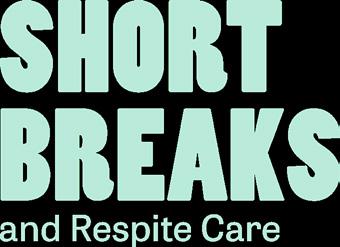
Email:shortbreaks@derwen.ac.uk
Telephone: 01691 779243
Website: shortbreaksatderwen.co.uk










Visit one of our Scan the QR Code to book your place, or see our upcoming dates below





Ludlow: Thursday 8 May 2025

Walford: Tuesday 13 May 2025




Short Breaks offers adults with learning disabilities and autism the opportunity to enjoy an individually tailored stay at our specialist respite centre.
Some of the activities we offer include:
Day trips: beach days, local attractions etc
Relaxation, games, socialising
Sports: basketball, football etc
Cooking and baking


Activities: bowling, cinema, arcade, shopping, theatre etc
The Olympics - and Paralympics& applauded for their coverage this year. Here at Disability Review Magazine, we want to see more of the same inclusion, year-round; here’s how to do that.
Each time there is a sporting event of note, it’s almost as if the world stops for just a moment, a spotlight cast on whatever city plays host. Who remembers the 2012 Olympic Games and how London seemed almost akin to the centre of the universe, just for a brief moment? There are other events, such as the Invictus Games and the Paralympics. This year saw some Olympians challenge the language of bias by declaring how they were not participants but competitors in the games themselves.
We
all have
a
responsibility
regarding language, which can be used for
discrimination against disabled people - and how that looks. While this issue is a celebration of what it means to live as a disabled person at this time, we also want to look at discrimination, how it affects us, and how we can build resilience against it. The Paralympics were a great exampleand this is how sporting events should be covered by media outlets. Consider this a ‘101 beginners guide’ of what needs to change or be executed better.
In her position as First Lady, Jacqueline Kennedy reportedly noted how anything in life - good or bad - starts with the words we use. (The Special Olympics were founded in 1968 by Eunice Kennedy, the sister of her husband.) We all have a responsibility







Where is the inbetween nuance, that this is merely just a human being who is allowed to live as all but themselves?
To suggest a Paralympian was a ‘participant’ in their own field of work is othering, in suggesting that this is akin to a one-off; they are competing as part of what they do for a living, regardless. To reduce somebody in such a way is ultimately reductive.
The activist Stella Young coined the term ‘inspiration porn’ during a talk she gave; in this, she noted the extremity that a disabled person has to live with. They are either perceived as being a ‘tragedy’ - somebody abusing state funds for their own selfish good,
someone who is to be pitied - or a ‘triumph’ - an inspiring force for good, who has ‘overcome’ their disability. Where is the in-between nuance, that this is merely just a human being who is allowed to live as all but themselves?
Sporting events are often framed as an inspirational feat; they are, in that these are people - the competitors - who have pushed themselves to the limits, to see what they can do. However, disability is a neutral concept; it is all but the texture of what we call ‘life’. Mobility aids are not to be ashamed of, they are not a weakness or an invalidation of you as a person. They are there to help you as a person - and may even mean that you are able to do more through their usage. A Paralympic competitor is inspirational for the feat(s) that they achieve - ‘overcoming’ should not be a part of the equation.
In our last issue we interviewed Gemma-Louise Stevenson; a sports journalist by trade, she is also a teacher and has also played professionally in the sporting space.

However, she has also previously remarked how - due to being a wheelchair user - it was automatically assumed that she was a competitor! (She had in fact been covering the relevant sporting event as a journalistand had instead gone to grab a coffee with an elaborate set up at the time.)
Just because they are disabled, does not make every single disabled person a Paralympian - or likely to compete at any given time. (And let’s be honest about
- and not to air grievances in front of, or about, a disabled person. See also: ‘I don’t know how I could live if I was disabled’. (Not okay to say in front of a disabled person at any time - as if they are a moral arbiter - and seemingly highlighted far more when there is a sporting event being broadcast.) The Paralympics are not a comment on how we should all physically be doing better - it is to see what a sporting elite can achieve during a very competitive set of games.
Not every single disabled person is a Paralympian, and nor should they feel obliged to be seen in such a way either.
Nuance is needed when events such as the Paralympics are covered in a newsroom or on television; the easiest way to cover events accurately, without ableism, is to turn to the experts - the disabled people! Ask them to cover the event, or better still, implement DEI training.

Our vision is to be the world’s leading accessible online marketplace, unlocking a more straightforward online shopping experience for disabled people everywhere. Find out more about EnableAll and how we’re setting a new standard for accessible online shopping inside.
Clothing, Shoes & Accessories
Home, Garden & Pets
Video Games & Consoles
Simple and user-friendly, free from overwhelming distractions.

The language used is consistently clear and easy to understand.

Accessibility tools that give you options and control to make the site work for you.
Toys & Games
Jewellery & Watches

















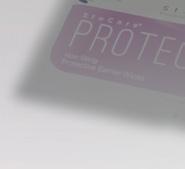

















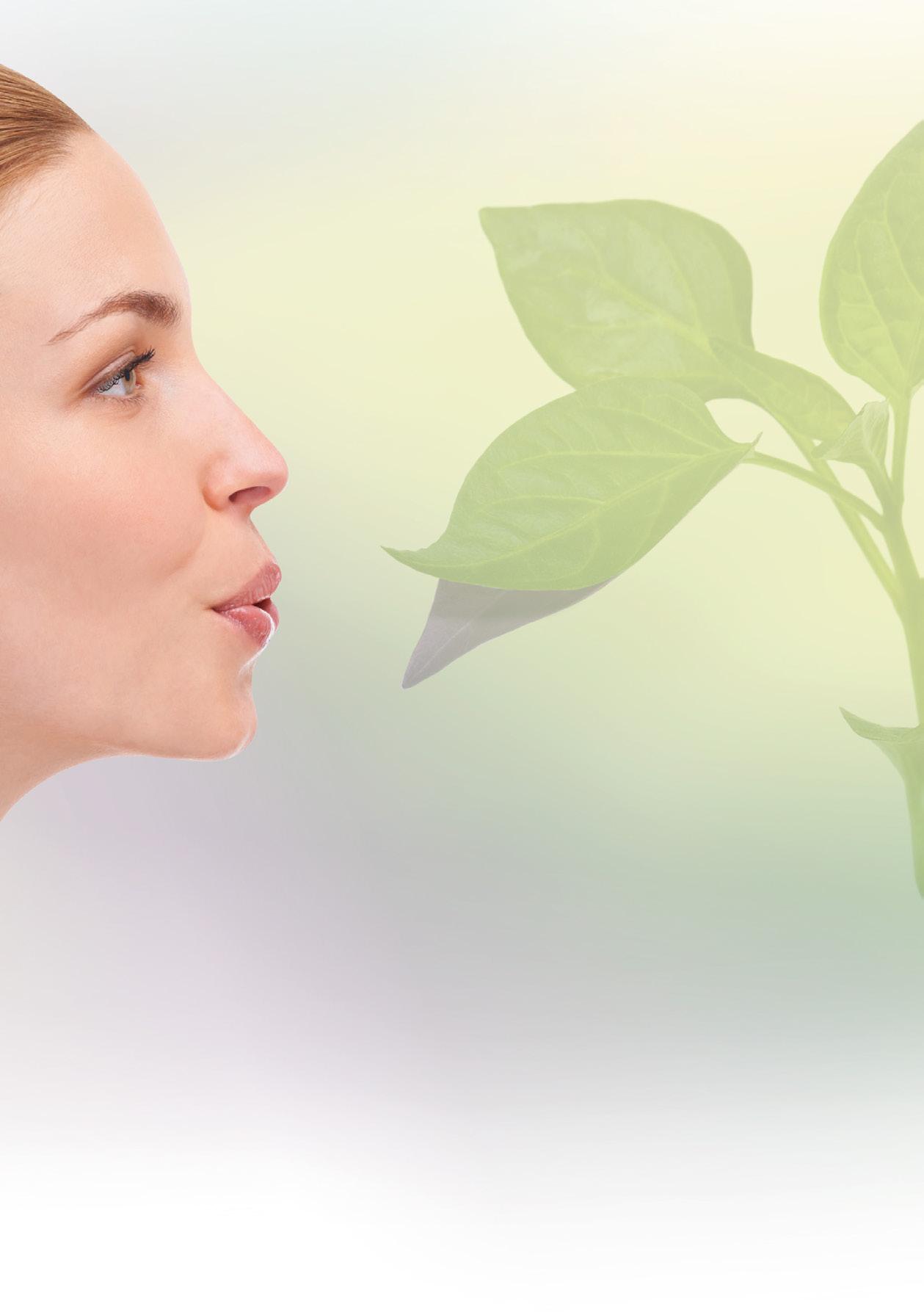






My journey into IBD and Ostomy life went from 0-100 very quickly. I was diagnosed with Crohn’s Disease during an emergency hospital admission after years of feeling too embarrassed to talk about my symptoms. Three days later, I was being told I’d need stoma surgery to save my life. I took to stoma life very quickly. It saved my life and I had to embrace that.



Almost six years down the line, I have gone from being an extremely unwell 20-yearold to a 26-year-old who uses that pain as a reminder to make each day count. One of the questions I had asked before my ostomy surgery is if I’d be able to dance again. Amateur Theatre has been part of my life for 20 years and I didn’t want this to stop that passion. The good news is that I was back on-stage dancing almost a year later and haven’t stopped since.
One thing I had on my post-surgery bucket list was to be in another show at the Minack Theatre. I had been in four productions at this venue prior to surgery and I sadly missed out on what would have been my fifth show there due to the timing of my diagnosis and surgery. I am so proud to say that I got to go back there last year with Redruth Amateur Operatic Society Trust performing Carousel. A Minack week has its challenges, but I listened to my body when I needed to and took time out when I needed to which meant I had the most amazing week with everyone. I’d love to know if any other ostomates have performed at the


Minack. This year, I will be performing Kinky Boots with RAOST, back at our home theatre in Redruth, Cornwall. This show is all about being who you want to be, believing in who you are, and celebrating differences. As someone who is living with IBD and a stoma, I want to make a difference and show that life isn’t over by believing in myself and celebrating being different!
I am so grateful that I have safe spaces to celebrate still being here. Living life to the fullest is my biggest goal as I could have missed all of this if it wasn’t for my ostomy surgery. I am here proving that life isn’t over when you have a stoma.





DIFFICULTY RATING: 4/5
A flavour, colour, texture & sensory explosion, this recipe by our resident DRM food writer Ian Taverner celebrates many influences.
Serves: 4-5 people | Cook Time: 10-12 minutes, plus 2 minutes extra for rice | Preparation time: 45 minutes | Total time you need to give yourself, start to finish: 75 minutes
1 Knife | 1 Chopping board |
1 Teaspoon | 1 Juicer or fork|
1 Zester | 2 Large mixing bowls (for the kofta & rice) | 1 Large mixing spoon | 6 metal skewers |
1 Baking tray | 1 medium mixing bowl (to make the dip with) | 1 Mixing spoon | 1 Platter or large bowl to serve the rice

Any ingredients marked with a * are a ‘straight swap’ for gluten-free and/ or vegan alternatives which can be found in a local supermarket or other providers.
FOR THE KOFTAS:
500g minced beef
1 red onion diced or frozen readychopped equivalent (1 cup)
1 red chilli, chopped or 1 teaspoon dried chilli flakes
2 teaspoons of dried oregano
2 teaspoons of ground coriander 1 teaspoon of ground cumin
1 microwave packet of wholegrain or basmati rice
1 spring onion, roughly chopped
1 handful of pomegranate seeds
1 handful of almond flakes
1 handful of mixed nuts & seeds
1 fresh mango, chopped (readychopped is also perfect)
1 handful of ripped fresh mint leaves
1 handful of sweetcorn (frozen or from a tin)
1 handful of fresh, ripped coriander
The juice & zest of 1 lemon
A splash of olive oil
100g of Greek yogurt*
85g of cucumber, diced
1 spring onion, sliced into small rounds
4 fresh mint leaves, chopped
1 teaspoon of ground black pepper
1 Preheat your oven to 200C and allow to heat up. Add all of the ingredients to the large bowl to start this recipe off.
2 Using your hands, really work the mix in the bowl together so that all of the ingredients are well combined. Split the mixture into 6 balls as equally as you can.
3 Carefully thread each ball on to a skewer. Gently squeeze the ball to make an oblong shape along the skewer, making sure to not do this toothinly. Repeat for each skewer that you have.
4 Place the skewer onto your baking tray and into the oven for between 10-12 minutes. This will depend on the thickness of your Koftas!
5 Carefully remove the skewers from the oven - and make sure to be very careful with the skewers as they will be very hot.
1 Cook the packet of rice as per the instructions on the back of the packet; this is normally around 2 minutes in total in a microwave.
2 Add all of the ingredients to a large mixing bowl and very carefully mix to combine them together.
3 Decant onto your serving platter/ bowl, and enjoy!

1 Add all of the ingredients to the mixing bowl.
2 Carefully mix with a spoon to ensure that they are all well combined, and then serve!
Serve the koftas on top of your jewelled rice and dribble over the dip, keeping some dip aside for extra dunking! I like to have one big platter of rice, with the koftas on top, dribbled in the dip, for everyone to dive in and enjoy! You can keep the uncooked skewers covered in your fridge for a few hours; if you like to meal plan/prep, the cooked koftas freeze well. The dip will keep in the fridge, as long as it is covered, for the same amount of time.
The rice is where you can really let your cookery imagination run wild! Why not try different dried fruits, combinations of nuts, or even other seeds? Another option
could be to change the mango for fresh watermelon! Have fun with the different combinations of servings! For a fabulous lunch, try serving the koftas and dip in a pitta bread, to shake up the serving options. If you want to add some extra spice to this recipe, ‘zing up’ the dip with a pinch of chilli flakes or a little dab of chipotle paste. For some extra freshness, squeeze a little lemon or lime juice over the koftas and dip when it comes to serving. The combinations for serving are infinite when it comes to this dish!
iIan Taverner, also known as Mr Cookfulness, is available for bespoke cooking shows, workshops, talk & programmes. The Cookfulness Cookbook is available in hard copy & e-book on Amazon, BookshopUk, and Waterstones. To enquire:
WEB: cookfulness.co.uk
EMAIL: cookfulness@gmail.com
INSTAGRAM: @cookfulness
TWITTER: @cookfulness
FABEBOOK: @cookfulness
YOUTUBE: @cookfulness




































A2ndvoice CIC has a rich history of providing diverse and inclusive activities catering to individuals of all ages, backgrounds and cultures, with special emphasis on supporting autistic individuals and their families.
We started as an voluntary group in May 2012 and became A2ndvoice CIC in 2018, over the past 12 years, our program has been instrumental in fostering community engagement and promoting the wellbeing of the autistic individuals and their families. We also collaborate and partner with many other autism SEND and non-autism SEND organisations to bridge the gap between di!erent communities across London breaking down language barriers, culture di!erences, stigma, myths and taboos.













living










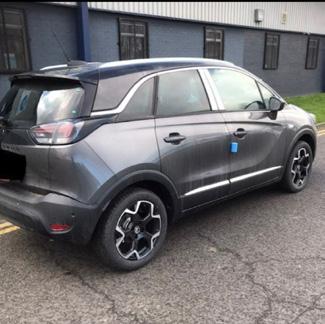




mobility aids, mobility scooters and powerchairs, vehicle adaptations, riser recliners, incontinence items, stairlifts and wheelchairs.
mobility scooters and powerchairs, vehicle adaptations, riser recliners, incontinence items, stairlifts and wheelchairs.
We do all of the Stage 2 conversions for the Motability Wheelchair
We do all of the Stage 2 conversions for the Motability Wheelchair
Accessible Vehicles (WAV’s)
Accessible Vehicles (WAV’s)
Battery checks and fitting
Battery checks and fitting



Installing vehicle adaptations including, Steering wheel aids, Hand controls, Twin Flip left foot accelerators, Right hand brake and accelerators, 40Kg, 80Kg, 120Kg Boot hoists, Transfer plates, Docking systems and pedal extensions.
Scooter and powerchair servicing and repairs
Installing vehicle adaptations including, Steering wheel aids, Hand controls, Twin Flip left foot accelerators, Right hand brake and accelerators, 40Kg, 80Kg, 120Kg Boot hoists, Transfer plates, Docking systems and pedal extensions. Scooter and powerchair servicing and repairs